International Forum on Peaceful Use of Nuclear Energy and Nuclear Nonproliferation / Nuclear Disarmament
Thursday, December 3rd, 2009 / Friday, December 4th, 2009 Hamarikyu Asahi Hall
Opening remarks
Mr. Toshio Okazaki, President, Japan Atomic Energy Agency
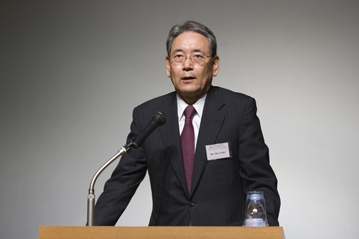
- This Forum is organized every year to look at today's challenges concerning peaceful uses of nuclear energy and nuclear nonproliferation. This latest occasion was jointly organized by Japan Atomic Energy Agency, the Japan Institute of International Affairs, and the University of Tokyo Global COE Program Nuclear Education and Research Initiative, with an aim to comprehensively examine the three pillars of the NPT, including nuclear disarmament, and to have an in-depth discussion of each issue.
- Important developments have been seen in the area of nuclear disarmament. First of all, President Obama of the United States who took office this year outlined his vision of "a world free of nuclear weapons" in his speech in Prague in April. Then, the United Nations Security Council adopted the resolution 1887 on Nuclear Nonproliferation and Nuclear Disarmament in September, followed by progress in negotiations between the United States and Russia for a new nuclear disarmament treaty which will replace START I. Also, at the last Japan-U.S. Summit Meeting, cooperation in the area of nuclear nonproliferation, safeguards and nuclear security was agreed. It is a welcoming sign that momentum towards nuclear disarmament and nuclear nonproliferation is growing in the lead-up to the nuclear security summit and the NPT Review Conference next year.
- On the other hand, international awareness of the importance of nuclear energy is ever rising, as more efforts are being called for to ensure stable energy supply and greenhouse gas emissions reduction. Interest in use of nuclear power is growing in the Middle East and Southeast Asia, and there is renewed interest in nuclear energy in the United States and Europe. We are definitely on the cusp of a "nuclear renaissance".
- In this circumstance, we need to further promote electricity from nuclear power without increasing the risk of nuclear proliferation, in other words, ensuring compatibility between nuclear non-proliferation and the peaceful use of nuclear energy is an important challenge for the sustainable human development.
- It is expected that further efforts by nuclear weapons States for nuclear disarmament would give new impetus to international nuclear disarmament and nuclear nonproliferation.
- Three pillars of the NPT, i.e., nuclear nonproliferation, peaceful use of nuclear energy, and nuclear disarmament are closely linked to one another, and initiatives which promote these three pillars in a comprehensible manner are important.
- At this Forum, a discussion should be held from the perspective, in particular, of how to promote peaceful uses of nuclear energy on an international basis.
- The organizers feel very privileged to welcome key persons from governmental agencies and international organizations as well as a number of professionals, to share their viewpoints through in-depth discussion.
- It should also be noted that, instead of the method applied in the previous Forums, a round-table discussion session is organized this time, time allotted to presentations is held to a minimum and more emphasis is reserved for discussions among panelists and interactions with individuals in the audience.
- The first keynote speaker is Mr. Yukiya Amano, the new IAEA Director General who took office on 1 December. We will have a video message from him. On this occasion, I would like to express my heartfelt congratulations to Mr. Amano on his appointment to the high office of Director General of the IAEA at the time when the role to be played by the IAEA is once again significant in terms of promoting peaceful uses of nuclear energy and nuclear nonproliferation.
- Other keynote speakers include Mr. Shunsuke Kondo, Chairman, Japan Atomic Energy Commission, to speak about a perspective on peaceful uses of nuclear energy; Ms. Bonnie Jenkins, Ambassador from the United States, to comment from nuclear non-proliferation viewpoints; and Mr. Nobuyasu Abe, Director, Center for the Promotion of Disarmament and Non-Proliferation, Japan Institute of International Affairs on Disarmament, to present a report of the International Commission on Nuclear Nonproliferation and Disarmament from the viewpoint of nuclear disarmament.
- The round-table discussions on the afternoon of the first day will consider nuclear nonproliferation, use of nuclear energy for peaceful purposes, and nuclear disarmament. In discussions, particular focus will be placed on the importance of promoting peaceful uses of nuclear energy and problems associated therewith; how to assist new nuclear nations with incorporating the so-called 3Ss, i.e., nuclear nonproliferation and safeguards, nuclear safety, and nuclear security, in their nuclear programs; and how to make the Additional Protocol more universal.
- The round-table discussion on the morning of the second day will debate, particularly from the viewpoint of safeguards, nuclear security and proliferation resistance, how nuclear proliferation could be prevented by combining proliferation resistance technologies and institutional measures, such as safeguards; compatibility of proliferation resistance and economic efficiency; and possible international criteria for analysis of proliferation resistance.
- The theme of the round-table discussion on the afternoon of the second day is multilateralization of the nuclear fuel cycle. It will be a multifaceted discussion directed at analyzing the specific proposals on the front-end of the nuclear fuel cycle, currently under discussion internationally as well as the multilateralization that covers the back-end.
- This Forum is convened at the Track II level with the purpose of encouraging free exchange of views among all participants, including governmental representatives, in their personal capacity. It is expected that issues or certain directions identified during the two-day discussion will contribute not only to the NPT Review Conference in April next year but also to other relevant international discussions.
Keynote Speeches
Ensuring Compatibility between Peaceful Use of Nuclear Energy and Nuclear Nonproliferation (Video message)
Mr. Yukiya Amano, new Director General of International Atomic Energy Agency (IAEA)
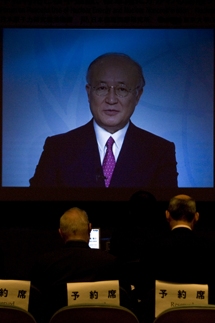
For both economic development and climate change reasons, the role of nuclear power as part of the energy mix will increase in the future. Despite the financial crisis, most countries have not scaled back their plans for nuclear power. In fact, the IAEA's projections suggest that, by 2030, global nuclear power capacity will grow by as much as 116% compared to that of today. The growth in nuclear power generation will bring new challenges for the IAEA. The Agency needs to be in a better position, when requested, to provide assistance to its Member States in their nuclear power programs. Nuclear fuel supply guarantees are an area that merits further attention. It is important that we should maintain sufficient capabilities to apply safeguards to additional nuclear materials and facilities. Additional protocols have been concluded with more than 90 countries at the moment, and they need to be made more universal.
This Forum is being held at a critical time for the future of nuclear energy, nuclear nonproliferation, and nuclear disarmament. In the ongoing strategic arms reduction negotiations between the United States and Russia, both sides have expressed the commitment to reduce their nuclear arsenals by one third. If achieved, it will be a very welcome follow-up to the UN Security Council resolution 1887 (adopted in September 2009 and aimed at setting a course toward a nuclear weapon-free world). The Review Conference of the Parties to the Treaty on the Non-Proliferation of Nuclear Weapons (NPT) will be convened in New York in May next year, and the NPT will remain as the cornerstone of global security. All five nuclear weapons States have committed themselves to making efforts to eliminate nuclear weapons, and non-nuclear weapons States are committed not to use nuclear energy for weapons purposes. Despite the challenges facing the NPT, I hope we will see positive developments which will contribute to a success of the Review Conference. The success of the Conference would reinforce confidence in the NPT and lay the groundwork for continuing cooperation on peaceful uses of nuclear energy, nuclear nonproliferation, and nuclear disarmament.
I believe that this International Forum, with participants from all over the world, will make useful contributions to promoting peaceful uses of nuclear energy, nuclear nonproliferation, and nuclear disarmament.
Current issues related to nuclear nonproliferation facing Japan
Mr. Shunsuke Kondo, Chairman, Japan Atomic Energy Commission
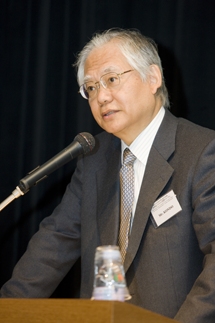
First of all, I would like to comment on the screening process carried out recently. Chapter 6 of the Framework for Nuclear Energy Policy (2005) noted that "the Government should implement nuclear energy measures, in particular research and development, from the perspective that comprehensive promotion based on a long-term perspective toward an uncertain future is necessary. The Government should explain to the people the significance of these measures and try to gain public trust as a promoter of such measures." To this end, the Committee has evaluated the policies, but having seen the discussion on the screening process and having listened to a wide range of views from the public with regard to the evaluation of the implementation of polices on nuclear energy, we feel it is necessary to reinforce the comprehensive coordination. In our future policy evaluations, we would like to take this into account.
Nuclear power's share of global electricity generation continued to rise at a moderate rate. As of 2009, 436 reactors with a generation capacity of 372 GW were operating in 30 countries, generating about 15% of the world's electricity and providing 5.5% of the primary energy. Many new nuclear power plants have been built in emerging nations in recent years, and according to the IAEA, more than 60 countries have expressed interest in new nuclear power generation and twelve countries are implementing specific programs to set up new power plants. The reasons behind this trend include, (1) nuclear power plants are operating safely in many countries, (2) the demand for electricity is rising in many countries, (3) the economic efficiency of nuclear power plants has improved, and (4) nuclear energy has been acknowledged as the biggest source of prominent low carbon energy.
The International Energy Agency indicated in its "Energy Technology Perspectives 2008" that, as a scenario to reduce the world's greenhouse gas emissions by more than half below 2000 level by 2050, 25% of the world's electricity would have to be generated by nuclear power plants in 2050. In order to achieve this, it will be necessary to launch operations of about 25 reactors every year for the next 40 years, leading up nuclear power plants with a generation capacity of 1400 GW, more than three times of the current capacity, being in operation in 2050.
On the assumption that nuclear energy is substituting thermal power generation using fossil fuels, nuclear power generation in Japan contributes to cutting annual CO2 emissions by some 20%, or reducing the use of fossil fuels by about 300 million tonnes per year. In Japan, nuclear energy is widely used as the safe and economic source of energy, and the Japan Atomic Energy Commission believes that a society that makes an even bigger contribution to securing a stable energy supply and stopping global warming should be created. To this end, the Committee requests that seven initiatives should be carried out in parallel, as follows:
- Ensure peaceful uses of nuclear energy and its safety;
- Manage and dispose of radioactive waste in an appropriate manner;
- Promote on a steady basis construction, operation and decommissioning of nuclear power plants;
- Use fuels recovered through the reprocessing in light water reactors for the time being, and build an interim storage capacity at the same time;
- Research and develop revolutionary nuclear energy technologies, such as fast breeder reactors and nuclear fusion;
- Collaborate and cooperate, in order for the international community to be able to promote the research, development, and use of nuclear energy in an effective and efficient manner while ensuring the safety of nuclear power and nuclear nonproliferation at the same time; and
- Build an infrastructure, collect knowledge, and establish a pool of human resources necessary for these initiatives, thereby gaining public trust.
Efforts for nuclear nonproliferation belong to the 7th initiative listed above. The Atomic Energy Basic Law of Japan strictly limits the use of nuclear energy to peaceful purposes, and Japan comes under IAEA comprehensive safeguards. At the same time, during the process of putting enrichment and reprocessing technologies to practical use, Japan has developed, and has implemented, safeguards to be applied to these technologies in cooperation with the IAEA and relevant countries. Furthermore, Japan supported the work to prepare a model additional protocol, took the lead in accepting the instrument once it had been finalized, and is encouraging other countries to follow suit. Since 2004, various facilities have been placed under comprehensive safeguards. We also comply with Nuclear Suppliers Group (NSG) Guidelines that set out rules for nuclear trade overseas and promote nuclear trade only within the framework of bilateral agreements; in doing so, we have made acceptance of the Additional Protocol one of the preconditions.
The Japan Atomic Energy Commission requests that administrative bodies submit a report on the management of nuclear materials and encourages business entities to publish their plans for plutonium use, in order to ensure Japan's commitment to nuclear nonproliferation and transparency. The Committee also requests that top management of relevant bodies create and promote the so-called nuclear nonproliferation culture, i.e., an organizational culture where a top priority is given to the safety as well as safeguards activities.
With regard to ensuring nuclear security, we believe that first, a series of measures by the government for the physical protection against acts of sabotage and for punishing offenders, second, initiatives on border control, and third, international response to international organizational activities beyond the control of the government, are required. On the domestic front, the Committee requests that the IAEA recommendations of INFCIRC/225 should be referred to in formulation of nuclear materials protection measures. In response to its 4th revision, the Committee institutionalized that a "design basis threat (DBT)" should be formulated by the Government and be presented to business entities not only for use as the basis for designing safeguards systems at a facility, but also to develop the facility's nuclear materials protection inspection system and the security system for protection of nuclear materials. Japan ratified the Convention on the Physical Protection of Nuclear Material in 1988, and then the International Convention for the Suppression of Acts of Nuclear Terrorism (adopted in 2005) in 2007 once the domestic system had been set up with the enactment of the Act on Punishment of Acts to Endanger Human Lives by Generating Radiation. Furthermore, following the adoption of the United Nations Security Council resolution 1540 that upholds the international cooperation to deter the use of weapons of mass destruction by non-State actors, necessary measures are being undertaken. By endorsing the Global Initiative to Combat Nuclear Terrorism (led by the United States and Russia), all the people involved, including governments, are providing their full support (from recovery of highly enriched uranium to preventing, detecting, and responding to terrorism activities). The Committee also believes it is imperative that, in order to ensure nuclear security, compliance with rules and commitment to improvement should be maintained at facilities at the highest level, and requests relevant parties to create such a nuclear security culture in their organizational culture.
In response to an increase in the number of countries having interest in nuclear power generation within the international community, three kinds of proposals have been submitted with a view to reinforcing the nuclear nonproliferation architecture, as follows: (1) Reinforce the obligations and the authority of the IAEA to have access to information and facilities of all countries, through measures such as an "Additional Protocol plus"; (2) Reinforce the safeguards capability of the IAEA through information driven safeguards activities; and (3) Produce factors which prevent a rise in nuclear proliferation potential (e.g., a system to notify the United Nations Security Council) as well as incentives for reducing such potential (e.g., build a mechanism to provide nuclear fuel cycle services under multilateral control and a system to apply proliferation resistance technologies).
A sign of new initiatives in the third category has received much attention. U.S. President Obama proposed in his speech in Prague in April this year that a new framework for civil nuclear cooperation, including an international fuel bank, should be built, so that countries can access peaceful power without increasing the risks of proliferation. Thereafter, senior representatives from the U.S. Departments of State and of Energy requested that serious consideration should be given as to how to achieve this thorough nuclear fuel services from a "cradle to grave" approach.
Japan has taken the initiative in adopting the concept of Safeguards by Design in its enrichment and reprocessing programs and in construction of MOX fuel fabrication facilities. It has also developed revolutionary, safeguards and nuclear security technologies and provided support for emerging nations in their efforts to set up a safeguards system. I believe that Japan should continue to promote these initiatives in the future in collaboration with interested countries and, at the same time, should proactively engage in activities for setting up a new international framework that would make nuclear nonproliferation and peaceful uses of nuclear energy compatible.
Mainly from the perspective of promotion of nuclear nonproliferation
Ms. Bonnie Jenkins, Ambassador, Coordinator, Threat Reduction Programs, Department of State, United States
(Read by Mr. Richard Stratford, Director, Nuclear Energy, Safety & Security, Department of State, United States)
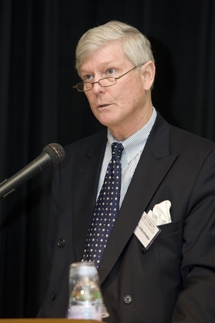
With regard to nuclear disarmament, one of three pillars of the NPT, in addition to reduction efforts by nuclear weapons States, it is important to ensure that non-nuclear weapons States do not acquire nuclear weapons. All Member States should therefore make efforts to achieve a general and complete disarmament under strict and effective international control. The background of recent advances in nuclear power is (1) ever increasing electricity demand due, in particular, to population growth and industrial development in developing nations; (2) diversification of energy sources from the perspective of energy security is requested; and (3) clean energy technologies is a growing trend. As was indicated in the speech made by President Obama in Prague, we should "harness the power of nuclear energy in our efforts to combat climate change and to promote peace".
According to the survey undertaken by the Carnegie Endowment for International Peace, Turkey, the Philippines and Egypt plan to introduce additional nuclear power facilities while Jordan and UAE are considering introduction of nuclear power for the first time. According to the recent report by the IAEA Director General, up to 60 countries have expressed to the IAEA their interest in introducing nuclear power generation programs. As nuclear energy use grows, the 3Ss concept, i.e., nuclear nonproliferation and safeguards, nuclear safety, and nuclear security, becomes more and more important. The threat of nuclear terrorism has become a fact of life, the importance of nuclear security has never been greater, and these are high on agenda for the Obama administration.
With regard to the risk of nuclear proliferation, a strict control to prevent a transfer is important. In this context, it would be important to set a limit to the spread of enrichment and reprocessing technologies. It is necessary that safeguards, including assurance of transparency and additional protocols, should be precisely applied to the existing or future facilities. It is important to increase the authority of the IAEA with regard to safeguards (in particular, detection of undeclared activities), and in this context, I expect that the new Director General, Mr. Amano, will exert his utmost ability.
When the revised Convention on the Physical Protection of Nuclear Material comes into force, it will give impetus to building basic nuclear security infrastructures. Therefore, I would call on every nation to sign and ratify the revised Convention. Protection of nuclear materials based on INFCIRC/225 is also an effective measure, and when finalized, INFCIRC/225/Rev.5 in 2010 will be an international basis.
With regard to the concept of a nuclear fuel bank, Russia's proposal on the International Uranium Enrichment Centre at Angarsk was approved at the IAEA Board of Governors Meeting last week, and again I expect that much progress to be made under the leadership of the new Director General.
A huge advantage of nuclear power is that air pollution and CO2 emissions are so minimal that they can be ignored, while it is important to set high criteria for the 3Ss in order to ensure its use for peaceful purposes. As its 3Ss initiatives, the United States has proposed projects on law and regulations, procurement of human and financial resources, and safety; control of nuclear materials; support for new nuclear nations in their programs to set up an infrastructure; maximum support for the IAEA and its technical cooperation programs; financial and human resource assistance to the Asian Nuclear Safety Network (infrastructure building in Vietnam, Thailand, Malaysia, Indonesia, and the Philippines), and has also worked on the concept of an international fuel bank. The U.S. Department of Energy (DOE), the National Nuclear Security Administration (NNSA), and the Nuclear Regulatory Commission (NRC) have concluded technical cooperation agreements with more than 40 countries. We also try to reinforce the Convention on Nuclear Safety through benchmark settings and through peer review, and to improve the Joint Convention on the Safety of Spent Fuel Management and on the Safety of Radioactive Waste Management through peer review. In doing so, we encourage more countries to join these international structures.
At the nuclear security summit in April 2010, I would like to request that participating countries should commit themselves to effective measures to ensure the security of nuclear materials, nuclear materials management, and nuclear material stockpile reduction. Nuclear forensics is also an important item for discussion, and we hope to increase cooperation with Japan and other countries in developing a framework for a nuclear forensic library.
The G8 Global Partnership against the Spread of Weapons and Materials of Mass Destruction, the Global Initiative To Combat Nuclear Terrorism, the United Nations Security Council resolution 1540, and other nuclear terrorism prevention measures thorough multilateral initiatives are important (this was confirmed at the Japan-U.S. Summit Meeting in November).
The Nuclear Suppliers Group (NSG) is discussing enrichment and reprocessing facilities and technological transfers. It is expected that a set of new proposals will be drafted to be submitted to its Plenary Meeting in Christchurch (New Zealand) in June 2010 for its approval.
The United States would like to pursue a so-called "from cradle to grave" comprehensive framework of the nuclear fuel cycle, with a view to reducing incentives for new enrichment and reprocessing programs. Also, at the same time, the United States will incorporate nuclear cooperation agreement provisions to ensure nuclear safety, safeguards, and the nuclear security.
The United States fully supports the United Nations Security Council resolution 1540 (increased export standards, a real-time crackdown on smuggling). Military exercises by U.S. armed forces focusing on the Proliferation Security Initiative (PSI) were effective in the past in persuading Libya to give up the pursuit of nuclear weapons. The NNSA is playing an important role in efforts to combat nuclear terrorism.
It is planned that weapons-grade plutonium from dismantled Russian nuclear weapons would be converted to MOX fuel (34 tonnes to be processed in seventeen years) for disposal.
I believe that we shall achieve big success in our efforts for building peace and security in collaboration with the international community, and would like to conclude my speech with quotes from a great physician A. Einstein: "The release of atomic energy has not created a new problem. It has merely made more urgent the necessity of solving an existing one."
Summary report on the "International Commission on Nuclear Non-proliferation and Disarmament"
Mr. Nobuyasu Abe, Director, Center for the Promotion of Disarmament and Non-Proliferation, Japan Institute of International Affairs
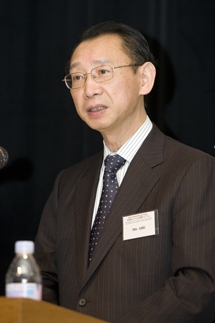
I would make a speech on behalf of Ms Yoriko Kawaguchi, Co-Chair of International Commission on Nuclear Non-proliferation and Disarmament, and former Foreign Minister of Japan, who had been expected to join us today. However, what is to be introduced therein reflects solely my own (Mr. Abe's) personal interpretation of the events.
Following the proposal by Australian Prime Minister Rudd in June 2008, the International Commission was set up in October 2008, to be co-chaired by Evans*1 and Kawaguchi. In addition to four meetings held during the period up to October 2009, the Commission has organized regional meetings in Latin America and Northeast Asia. The Commission is comprised of fifteen commissioners, including representatives from five nuclear weapons States, India and Pakistan, and some twenty advisory board members, and receives cooperation and advice from nuclear disarmament/nuclear nonproliferation research institutions all over the world. A report of the meeting in Hiroshima in October 2009 (some 300 pages in A4 size) was compiled, finalized and published in December of the same year. It will be submitted by the Co-Chairs to prime ministers of Japan and Australia.
With regard to the specific contents of the report, it has been compiled as a set of recommendations from the perspective that it is important to persuade political leaders of nuclear weapons States. The nuclear weapons destructive force (more than 100,000 people died in Hiroshima and Nagasaki, human beings will be annihilated if the existing tens of thousands of nuclear weapons are detonated, detonation of 100 or so nuclear weapons will cause devastating effects, including global climate change and environmental destruction); the reality that it is actually difficult to use nuclear weapons (ethical, political and emotional taboos); why should we possess weapons that cause indiscriminate destruction and which we cannot use?; should we renew or reinforce these weapons? - these issues are highlighted in the report, with a view to discouraging countries from building up their nuclear forces or planning secret possession of nuclear weapons.
A two-tier nuclear disarmament program has been proposed as a feasible means to achieve reduction in nuclear weapons in reality, as follows:
- Stage I: Minimize nuclear stocks
- Reduce stocks to a "minimum level" by 2025. In consideration of the difficulty of decommissioning nuclear weapons as well as their role as a deterrence, stocks should first of all be reduced to fewer than 2000 weapons, which is equivalent to 10% of the current stocks. Formulate a short-term action plan (until 2012) as a preliminary stage - the goal is to implement this action plan by the end of the first term of President Obama, who outlined his vision of "a world free of nuclear weapons". A medium-term action plan (until 2025) - reduced role of, and reduction in nuclear weapons. They would be kept only for deterrence purposes, and thereafter a pledge of no first use should be made. Japan should request this of the United States. The time lag between possession for deterrence purposes and a pledge of no first use has been proposed in consideration of security concerns of Member States about the North Korean nuclear weapons program.
- Stage II: Abolish nuclear weapons
- From 2025 onward, an overhaul of the international security regime will be necessary, including consideration of a possible military balance at the time when nuclear weapons are completely reduced to nil, in order to ensure, for example, measures to be undertaken at the wake of invasion. It will be indispensable to establish a structure to absolutely prevent, and to review, nuclear proliferation.
In reference to the reasons for the 2005 NPT Review Conference being unsuccessful, i.e., (i) no progress on nuclear disarmament, and (ii) no progress on the proposal for a Middle East nuclear-free zone (a concept proposed by its meeting in 1995), the report makes twenty proposals to the NPT Review Conference in May 2010. These include, inter alia, a means to prevent nuclear proliferation by ratification of additional protocols by all IAEA Member States as a condition for supplies of nuclear materials and technologies; further efforts to promote the entry into force of the Comprehensive Test Ban Treaty (CTBT), and until the Treaty comes into force, nuclear tests should be refrained from; and further efforts to facilitate negotiations on a Fissile Material Cut-off Treaty (FMCT) so as to promote its entry into force as soon as possible, and until then, production of fissile materials should be refrained from. Among those, there are proposals targeted at countries that have not yet declared a nuclear test moratorium, and at India and Pakistan, which continue production of nuclear materials for weapons purposes.
It should be noted that, although the aforementioned two-tiered nuclear disarmament program had been criticized by organizations in Hiroshima for being more lukewarm compared with the 2020 Vision Campaign by Mayor Akiba, the proposed program was formulated with a focus on the practical feasibility.
Round-table Discussion 1
"Three pillars of the NPT - peaceful use of nuclear energy, nuclear nonproliferation, nuclear disarmament"
Attendance:
- Mr. Nobuyasu Abe (Moderator)
- Ambassador, Director, Center for the Promotion of Disarmament and Nonproliferation, Japan Institute of International Affairs
- Mr. Peter Carter
- Head of Nuclear Non-proliferation, Department of Energy and Climate Change, United Kingdom
- Mr. Tetsuya Endo
- Former Vice Chairman, Atomic Energy Commission of Japan
- Mr. Valentin Ivanov
- Professor, Russian Academy of Science
- Ms. Caroline Jorant
- Director, Nonproliferation & International Institutions, AREVA, France
- Mr. Hun-Gyu Lee
- Senior Advisor, Korea Institute of Nuclear Safety
- Mr. Odilon Antonio Marcuzzo do Canto
- Secretary, Brazilian-Argentine Agency for Accounting and Control of Nuclear Materials (ABACC)
- Mr. Hiroki Mitsumata
- Agency for Natural Resources and Energy, Ministry of Economy, Trade and Industry, Japan
- Mr. Akihiko Nakajima
- Deputy Director-General, Ministry of Foreign Affairs, Japan
- Mr. Toshio Okazaki
- President, Japan Atomic Energy Agency
- Mr. Richard Stratford
- Director, Nuclear Energy, Safety & Security, Department of State, United States
- Mr. Satoru Tanaka
- Professor, University of Tokyo, Japan
- Mr. Tomihiro Taniguchi
- Deputy Director General, International Atomic Energy Agency (IAEA)
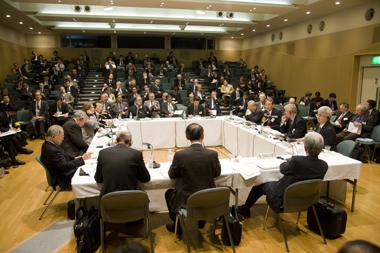
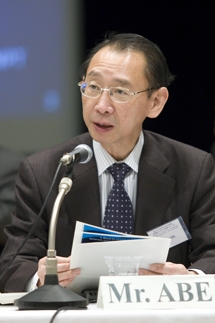
At the opening of the discussion, Moderator Mr. Abe raised problems related to the three pillars of the NPT, i.e., peaceful use of nuclear power, nuclear nonproliferation, and nuclear disarmament, as follows:
- Peaceful use of nuclear energy and nuclear nonproliferation
Issues from the perspective of promotion of peaceful use of nuclear power
- How to support new countries introducing nuclear power ("new nuclear nations") in their efforts to develop infrastructure;
- How to build a workforce of young scientists and engineers required for nuclear power expansion;
- How to facilitate research and development of next generation nuclear energy systems; and
- How to promote international cooperation in the field of nuclear power.
- Peaceful use of nuclear energy and nuclear nonproliferation
- Support for new nuclear nations to incorporate the 3Ss (nuclear safety, safeguards (nonproliferation), nuclear security) in their nuclear programs;
- Stepping up the existing nonproliferation measures, e.g., safeguards, protection of nuclear materials, export control, bilateral agreements on nuclear cooperation; and
- Introduction of new nonproliferation measures, e.g., multilateral control over nuclear fuel cycle and proliferation-resistant technologies.
- Inherent problems with the NPT
- How to overcome the discrimination (discrimination between nuclear weapons States and non-nuclear weapons States, discrimination between States that possess nuclear fuel cycle technologies and States that do not);
- How to make it difficult for NPT signatory countries to withdraw from this regime; and
- How to secure compliance with and implementation of the treaty.
- Promotion of nuclear disarmament and nonproliferation by all nuclear weapons States including non-NPT signatories
- Importance of the progress made by the nuclear weapons States on nuclear disarmament from the perspective of convincing non-nuclear weapons States to accept the strengthening of nonproliferation measures; and
- How to incorporate non-NPT signatory countries into the international regime for nuclear disarmament and nonproliferation.
Based on these problems, focus was placed on the following six issues in this round-table discussion:
- How to promote nuclear power in a sustainable manner, and how to solve problems associated therewith;
- How to assist new nuclear nations to incorporate the 3Ss in their nuclear programs;
- Whether a multilateral control over nuclear fuel cycle should be effective from the viewpoint of nonproliferation;
- How to make the Additional Protocol more universal;
- How to overcome the sense of unfairness that results from the NPT regime; and
- How to evaluate nuclear cooperation with non-NPT signatory countries.
[Issue 1. How do we sustain the promotion of nuclear energy and address its challenges?]
(Carter)
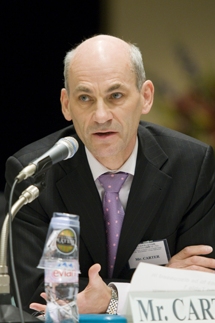
- The United Kingdom is increasing its use of nuclear power. Will the worldwide use of nuclear power increase the risk of nuclear proliferation? If so, how should we respond? The UK government has recently compiled a paper "The Road to 2010". The paper lists problems to be considered at the NPT Review Conference. There is no fundamental solution to the growing risk of nuclear proliferation and this paper does not contain any novel ideas. I would like to introduce three important points raised in this paper.
- The IAEA plays a major role in fostering the peaceful uses of nuclear power and is highly important in this context. The United Kingdom has acknowledged the importance of the Agency and has thus provided necessary assistance to the IAEA through implementation of programs to promote safeguards and support development of the safeguards procedure to be applied at enrichment facilities. With regard to enrichment technologies, it is important to "black box" such technologies.
- The United Kingdom supports fuel supply guarantees and the concept of a fuel bank. The United Kingdom has also presented its own proposal for instituting fuel supply assurance arrangements in order to respond to the situation of supply disruptions caused by non-political reasons.
- With regard to human resources development, I believe that it is necessary to create educational opportunities to develop new skills. The paper refers to a plan to establish a Nuclear Centre of Excellence (COE) in the United Kingdom with a view to improving not only the access to the peaceful use of nuclear power but also proliferation resistant policies and technologies. It is envisaged that a partnership would be formed between universities, nuclear industry and international agencies.
- There are three ways to assist emerging nuclear nations, i.e., (1) the IAEA plays a central role, (2) cooperation within the framework of a bilateral agreement, and (3) responsibilities of new nuclear nations.
(Ivanov)
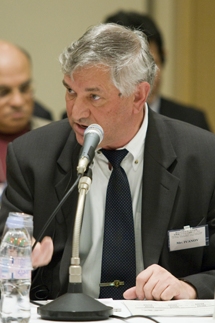
- New initiatives must be launched on the issue of nuclear power. At the moment, we are only looking at the stable framework of large reactors and uranium fuel, and this is insufficient for finding solutions to the problem of nuclear proliferation. I believe that new nuclear nations may want to get electricity itself rather than enriched uranium, and in this context I do not believe that a fuel bank would be effective. For example, Russia is building floating nuclear power plants with less than 100 MW installed capacity and the reactors to be used at these plants will be returned to suppliers; thus, the risk of nuclear proliferation is minimal.
- For those countries which had been nuclear customers during the Soviet era, the former Soviet Union had provided fuel and brought back the spent fuel, until around 2001-2002 when the arrangement was terminated. For new nuclear nations, the management of the spent fuel is a headache. Taking back spent fuel is effective in terms of nuclear nonproliferation.
- If a new electric power capacity is required, the concept of an international nuclear power generation centre may be necessary. We may well consider a scheme in which third countries supply electricity to emerging countries.
- Nuclear nonproliferation is difficult to achieve without a new idea. Making a proposal is insufficient; it would be necessary to indeed take the first step.
(Mitsumata)
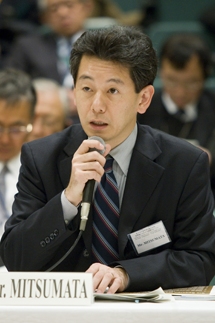
- It is inevitable that the use of nuclear power will expand internationally. In order to promote peaceful use of nuclear power, it is important to ensure nuclear nonproliferation as well as the nuclear safety. Japan has led efforts on the peaceful use of nuclear energy, taken the initiative in accepting safeguards and made a commitment to nuclear safety, thereby delivering many results by now. Against this background, I believe that Japan finds itself in a position to make its utmost contribution and that a contribution to the international community is its important responsibility.
- Looking from the industry perspective, Japanese electric companies and associated companies set up the Japan-ASEAN (Association for Southeast Asian Nations) Integration Fund (JAIF) International Cooperation Center in March this year. The Center will play a central role in infrastructure development in order to respond to the needs of new nuclear nations. The Center will work with the government.
- A question as to what kind of role the industry would play in the field of nuclear nonproliferation needs to be considered in the future. Here, I would like to point out three issues:
- It has been acknowledged that the role of the IAEA - not only its safeguards system but also its activities in the nuclear safety - needs to expand. It would also be necessary to promote the application of the Additional Protocol to new nuclear nations. A wider acceptance of the Additional Protocol will lead to a physical expansion of the role of the IAEA. It is important therefore to raise international awareness of it.
- Even at the stage of research and development of a light water reactor (LWR) as well as a fast breeder reactor (FBR), it is necessary to take the relevant factors into account, such as the application of a design with due consideration of proliferation resistance and the protection of nuclear materials.
- A prominent aspect of the nuclear industry is that it has become borderless, and major conglomerates have been become dominant. In principle, the State is expected to be primarily responsible for setting up a framework; however, it may be beneficial to let business entities take the initiative in drawing up a Code of Conduct to establish a framework, so as to supplement the framework set by the State.
[Issue 2. How do we support emerging nuclear nations in securing the 3Ss?]
[Issue 3. How effective is multilateralization of the nuclear fuel cycle from the perspective of nuclear non-proliferation?]
(Endo)
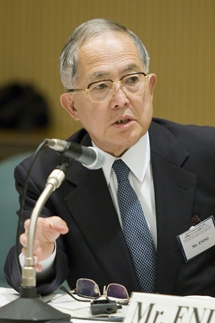
- The importance of each component of the 3Ss, i.e., nuclear safety, safeguards (nuclear nonproliferation) and nuclear security, has been discussed in the past. However, it was in the communiqué of the G8 Summit in Hokkaido Toyako (2008) that these components were taken up altogether as the 3Ss for the first time. Its importance was reconfirmed at the G8 Summit in L'Aquila (2009). As the 3Ss concept was introduced by Japan, discussion on this issue should be lead by Japan in the future; however, from the level of efforts made so far, it seems that the government of Japan is rather slow to act.
- During today's morning session, support from the United States for the 3Ss concept was expressed by Ms. Jenkins (the message was read by Mr. Stratford on her behalf). However, the IAEA is not necessarily enthusiastic about the 3Ss, indeed, it seems that it has a rather a negative impression about it. The reasons behind the IAEA's attitude may be that promotion of the 3Ss may instead increase gravity of North-South issues because developing nations see the promotion of the 3Ss as the introduction of a new regulatory system, and that the IAEA, which compiled the "Milestones in the Development of a National Infrastructure", listing 19 major issues to be considered by new nuclear States in infrastructure building, may feel repugnant to the 3Ss, which represent only three of these issues. Such are the current circumstances, and it is necessary in the future to work out the details, at the initiative of Japan, and in cooperation with the United States, the United Kingdom, France, Russia, and the IAEA, to shape the 3Ss concept.
(Taniguchi)
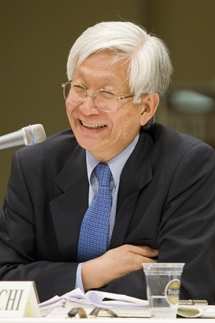
- The IAEA had internal discussions about 3Ss to come up with a collective view in response to the Japanese initiative. The initiative is significant in the sense that it has brought together the three components important for the introduction of nuclear energy, and there is clearly a synergy between nuclear safety and security, as well as between security and safeguards. In particular, on issues that may involve parties other than States, I believe it is important to take full advantage of aspects of the 3Ss which are deemed effective.
- Developing nations are concerned that the IAEA may intervene in their own programs on the grounds of nuclear security and nuclear safety. The IAEA has so far explained to developing nations that it is committed to a balanced approach in promoting regulation and development. It intends to assist the introduction of nuclear power in developing nations in a balanced manner so as to facilitate development of these nations at the same time, and has high expectations for Japan. With regard to the notion that the 3Ss concept takes up only three of the nineteen issues listed in the IAEA's Milestone paper, I believe that the underlying concept is that all nineteen issues are after all inextricably linked to the three issues, i.e., nuclear safety, nuclear security and safeguards.
- In the nuclear world, we should better consider how to respond to new ideas, possibilities, and challenges. It was said that nuclear power capacity could double by 2030, but this is a possible upper limit assumption, i.e., twenty countries to introduce nuclear power, or some 440 nuclear reactors to be installed in nuclear power stations. The lower limit in this assumption is five countries introducing nuclear power and installation of 100 plus some tens of nuclear reactors. In this context, it should be noted that in this assumption, the majority of countries planning to further promote the use of nuclear power are existing nuclear power States, such as India, China, and former Soviet republics.
- Traditionally, the introduction of nuclear power had been planned and implemented in technologically advanced countries. However, today, in many cases, it is a problematic nation or a country with limited technical capacity that is planning to introduce nuclear power; it could therefore be said that the risk of nuclear proliferation has increased. How to respond to uncertainty and changes arising during the process of introduction needs to be considered. For a country with poor technical and social infrastructure, a margin for responding to uncertainty is important. Judging from the trend among new nuclear nations, it seems that these countries intend to introduce nuclear power for strategic reasons, rather than for technical and economic ones.
- Traditionally, one of the principal activities of the IAEA has been to provide assistance to developing nations. However, self-help efforts are first of all necessary to make use of highly-demanding technology such as nuclear power; otherwise, a country that requires complete support for every aspect of its program may face difficulties introducing nuclear power. It is a problem (more serious than just being a question of paternalism) that a country would introduce nuclear power when it is still totally dependent on nuclear developed nations, i.e., suppliers of materials and equipment, and in this respect it may be better that a slightly tighter standard should be set for the introduction of nuclear power.
(Nakajima)
- Some developing nations view the 3Ss as an attempt by nuclear developed nations to erect technical barriers, but the 3Ss is the "royal road" and it is therefore necessary to devise an approach to let it be known that this is instead the shortcut to making use of nuclear power. In order to do so, a tutorial approach, which explains how people have instituted these infrastructure sectors in order to successfully establish nuclear energy, may be necessary to facilitate understanding of factors behind the standard setting, instead of an approach of imposing a certain pattern on new entrants only to satisfy certain requirements.
- Although this may be difficult to implement in certain respects, what is important is to properly demonstrate the whole range of measures to be undertaken at the time of the introduction of nuclear power. Each sector involved in nuclear power, i.e., the research and development sector, nuclear power-related industrial sectors, the nuclear safety sector, as well as safeguards, is highly specific and requires a wide range of technical know how. It is important to ensure that experts involved in nuclear energy share awareness. It seems that awareness sharing is customary within some individual sectors, but the question is whether such awareness sharing could be achieved across the industry as a whole.
- A tight schedule makes it difficult to implement the introduction of nuclear power. Infrastructure building in the run up to the introduction of nuclear power should be a project with at least a ten-year completion phase. The fact that nuclear power involves a wide variety of academic studies and that infrastructure building for nuclear power introduction could bring additional benefits to new nuclear nations may be a point to be highlighted.
- With regard to a role to be played by the IAEA on the 3Ss issues, I believe that the IAEA could serve as the repository for 3Ss knowledge and practices.
(do Canto)
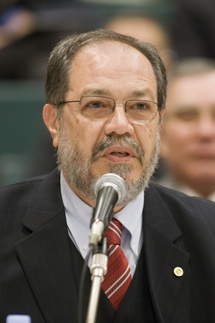
- As the Secretary of ABACC, I would like to consider whether it would be possible to involve young scientists and researchers in nuclear power.
- First of all, please remind yourself that geographical conditions of Brazil as being part of Latin America are different from those of Japan, China and South Korea in Asia. Interest in science in general has been lost in Brazil and there are acute shortages of human resources in areas of engineering. Brazil is on the way towards economic growth and, as such, engineers and engineering support staffing are indispensable. It is necessary to set up a proper educational environment, because student enrollment in science courses at the high school level is rapidly declining. My general impression about the three pillars of the NPT is associated with the comment made by the Secretary-General of the United Nations last week that too many funds were being allocated for weapons related matters, resulting in a shortage of funds for peace related activities. Nuclear power has a Jekyll-and-Hyde character; it is important to emphasize its aspect of Dr. Jekyll, i.e., the positive aspects of nuclear power, and to eliminate its aspect of Mr. Hyde, i.e., the negative aspects. In doing so, nuclear power could also offer a solution to the income gap between countries.
(Lee)
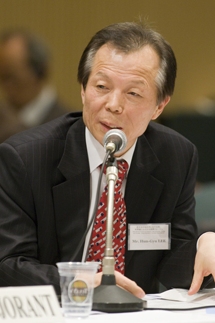
- Many countries have taken advantage of nuclear power. South Korea, too, has imported technologies from overseas, and it is now capable of designing a nuclear power plant by itself. From our experience in South Korea, I believe it is possible to introduce nuclear power in new nuclear nations without proliferating sensitive technologies.
- Today, I would like to focus mainly on the "promotion of the 3Ss". Japan is a non-nuclear weapons State but has an excellent track record in the peaceful use of nuclear power. In this context, I have high expectations for Japan to take an initiative in providing assistance to new nuclear nations. With regard to the 3Ss, it would be necessary to provide support through international as well as regional approaches. The IAEA should play the leadership role in terms of the 3Ss.
- One of the options is to take a phased approach. In South Korea, it used to be the case that engineers were sent abroad for training at the time when overseas technologies were imported to set up a nuclear power plant. A professional organization was set up for regulatory purposes. In South Korea, nuclear power plants now operate at an over 90 percent capacity factor. Involvement of the regulatory authority at the nuclear reactor design stage and at later stages in the lifetime of nuclear power plants contributes to improvements not only in safety but also in operating efficiency.
- On the issue of nuclear nonproliferation, based on the North-South Joint Declaration on the Denuclearization of the Korean Peninsula, South Korea established a bureau in charge of verification. Also, when ratifying the Additional Protocol, we submitted an application for a small-scale test. Thereafter, a State system of accounting and control was set up and an agency in charge of safeguards, export control and protection of nuclear materials was established. Therefore, South Korea has experience in promoting the 3Ss concept. In fact, we have launched a project to educate and train nuclear safety professionals in Asian nations. Success of 3Ss-related activities in the future depends on whether we could be successful in educating and training personnel to be involved in the 3Ss through provision of incentives.
- It was said that global nuclear power capacity could double by 2030. However, it is economically inefficient and not desirable that many of the countries with nuclear power plants come to possess sensitive nuclear technologies. For countries operating nuclear power plants, a guarantee of supply of high quality electricity at a decent price as well as assurance of a reliable fuel supply are necessary. Proliferation resistance technologies with acceptable economic efficiency would also be necessary. In order to make multilateral fuel supply guarantee arrangements successful, a political consensus based on efforts by the IAEA and its Member States is necessary.
- In South Korea, a solution to the question of spent fuel management has not been identified. I believe that steps towards nuclear fuel cycles under multilateral control should be produced by a comprehensive package devised from the perspective of not only nuclear nonproliferation but also radioactive waste disposal. It is therefore important to set up a framework involving suppliers, receivers, international organizations, non-governmental organizations and academia.
(Stratford)
- The standard of nuclear safety and nuclear security in new nuclear nations must be raised to an acceptable level. On the issue of nuclear security, the United States is entitled under the bilateral nuclear energy agreement it concludes to visit its counterpart (so-called "cooperative visit") to verify the status of nuclear security and to request corrective measures. On the other hand, on the issue of nuclear safety, it will be effective to request new nuclear nations to sign the Convention on Nuclear Safety as well as the Joint Convention on the Safety of Spent Fuel Management and on the Safety of Radioactive Waste Management. These conventions provide that the measures taken by signatories aimed at abiding by the obligations of the conventions will undergo peer review at review meetings to be held every three years. Such processes are effective in tightening nuclear safety. Voluntary actions are required in order to disseminate good examples and to raise other safety standards.
(Okazaki)
- Let us study actions against global warming. It does not make sense that nuclear contributions have not been considered at COP15. Furthermore, nuclear contributions beyond 2030, which is outside of the scope and intent of COP15, are also important.
- Issues concerning new nuclear nations and the 3Ss have been taken up in the context of measures necessary for promotion of nuclear power. It is necessary to share awareness on these issues as well as the whole picture on the use of nuclear power. Furthermore, it is our responsibility to set up a reliable system that brings together perspectives of fuel supply guarantee, next generation nuclear energy systems, as well as of safety and nonproliferation. Contribution by Japan to regional cooperation, especially in the East Asia region, is called for.
(Tanaka)
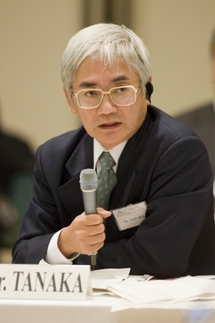
- I would like to emphasize the importance of human resources development. Academia, research institutions, industries, and universities should all promote cooperation at the international level. From the perspective of nuclear nonproliferation, it is important to educate and train personnel who can make an objective judgment.
(Jorant)
- It would be necessary to educate and train human resources during the in-between period from the time when a political decision is made to build a new nuclear reactor until the time when the construction is actually initiated. By making use of international cooperation, it is necessary to educate and train personnel who would play the leading role in nuclear power development. Within this context, the IAEA plays a critical role.
- In terms of personnel, various experts, such as legal and industrial professionals, are required.
- With regard to the 3Ss, economic factors and waste management were taken up in discussions at the Generation IV International Forum (GIF) and INPRO. However, these factors have been omitted in this discussion about the 3Ss.
- The issue to be considered is to whom the 3Ss concept should be appealed - to the international community, to the IAEA, to the industry, or to designers? It is important to incorporate the 3Ss into the design.
- Some think that inspectors should inspect the security and safety, but I doubt that it would work well.
[Issue 4. How do we promote universal adherence to the Additional Protocol?]
(Nakajima)
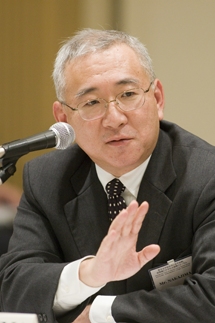
- One of the main pillars of the Japanese foreign policy is making the Additional Protocol more universal. Japan encourages non signatories to ratify the Additional Protocol and makes the ratification of the Additional Protocol a condition for a bilateral nuclear cooperation agreement. Approaches to facilitate ratification of the Additional Protocol, as well as details of a message to be sent out to facilitate ratification, need to be identified. In this respect, I would like to highlight the three points, i.e., (1) the status of a signatory to the Additional Protocol should be endorsed by the IAEA so as to bring political benefits; (2) trust building among relevant parties is the process towards the ratification goal; and (3) when ratifying the Additional Protocol, some expressed concerns that Japanese sovereignty may be undermined, but safeguards are more or less a joint work with the IAEA in reality, and as a result of various experiences of working with the IAEA, trust between Japan and the IAEA has been built.
- It could be said that what could be considered a safeguards technical community has been established. Application of the Additional Protocol may improve the technical capacity of such a community.
(Taniguchi)
- In the sense of coordination between technical knowledge and actual implementation, establishment of a technical community is an issue to be considered in the future. In terms of responding to inspections, Japan does not necessarily have an excellent record, though the reality is that one-third of the whole IAEA inspection resources i.e., Number of Person Days Inspection (PDI) , continue to be apportioned to Japan. In this context, it is important that Japan should play a role to fill the gap so as to improve recognition of safeguards.
- In relation to new nuclear nations, the Additional Protocol is a carrot and stick approach. The fact that it is seen rather as a "stick" approach is an issue to be considered. In a message to new nuclear nations, it would be indispensable to encourage them to recognize the "carrot" elements to be derived from the ratification of the Additional Protocol. Current efforts in this respect are insufficient.
(do Canto)
- According to a paper published by a former Brazilian ambassador, the position of Brazil is that it does not see any major obstacle in ratifying the Additional Protocol but that it does not intend to take any additional measures for nuclear nonproliferation, including ratification of the Additional Protocol, unless nuclear weapons States promote nuclear disarmament.
(Stratford)
- The Additional Protocol is a tool indispensable for detecting undeclared activities. The point is that non-nuclear weapons States should take an approach to ensure transparency through ratification and application of the Additional Protocol.
(Okazaki)
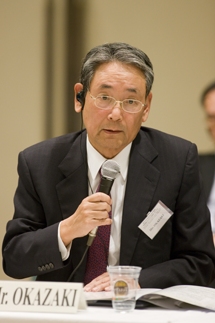
- In order to enhance the nonproliferation regime, it would be very important to achieve greater efficiency in safeguards implementation by the IAEA, States and regions. In this context, application of the Additional Protocol is quite significant, and is necessary to achieve the transition toward integrated safeguards. In addition, through the application of an "Additional Protocol plus", measures beyond the scope and intent of the Additional Protocol, should be undertaken.
- Based on this recognition, it is important to send a message to non signatory countries to inform them of how greater efficiency in safeguards could be achieved through the application of the Additional Protocol. Also, in relation to the Additional Protocol, concerns about infringement of sovereignty should be thoroughly discussed.
[Issue 5: How do we overcome the perception of inequality in the NPT regime?]
(Stratford)
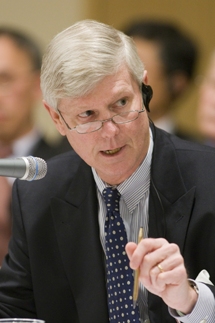
- The first step to be taken by nuclear weapons States to demonstrate that they would follow the same rules as with non-nuclear weapons States is to conclude a voluntary offer safeguards agreements. The United States, under the voluntary offer safeguards agreement with the IAEA, has designated 250 nuclear facilities to be listed on the eligible facilities list. Some may well argue that safeguards are being applied to only two of these facilities. However, in addition to the fact that safeguards focused on countries which already have nuclear weapons have little significance in substance, there is a financial problem; if all facilities in the United States are subject to safeguards, 125 times more resources will be required. Also, with regard to the Additional Protocol, some criticize that what is signed by nuclear weapons States and what is signed by non-nuclear weapons States are not the same. Theoretically, it is a question of how useful it could be to apply an additional protocol for the purposes of identifying undeclared nuclear activities to a nuclear weapons State undertaking undeclared activities, and this can be one of issues to be taken up as part of measures to relieve the sense of unfairness.
- The question of "whether progress in disarmament could contribute to relieving the sense of unfairness on the part of non-nuclear weapons States" is not an appropriate question. The issue being raised by non-nuclear weapons States is not that there exists discrimination between nuclear weapons States and non-nuclear weapons States, but that possession of nuclear weapons itself is not morally right. If the Moscow Treaty is to come into force, the United States will be obliged to substantially reduce its nuclear weapons. However, unless world nuclear weapons are reduced to zero, there will always be criticism that efforts for nuclear disarmament are insufficient.
- With regard to the question of "whether a multilateral control over nuclear fuel cycle should be effective in eliminating discriminatory aspects of the NPT", my answer is no. Enrichment facilities are operated by private companies, and under the current business practice, these private companies are taking the black box approach not to transfer technologies on grounds of nuclear nonproliferation for sure, but rather more for the purposes of protecting sensitive information. I can only say that countries without enrichment technologies should direct their grievances to private companies.
- Inequality between countries possessing nuclear fuel cycle technologies and countries without nuclear fuel cycle technologies is also the same. In a nutshell, those who have technologies refuse technology transfer in order to keep their competitiveness. It is not the case that a country is deprived of the right to possess technology.
(Jorant)
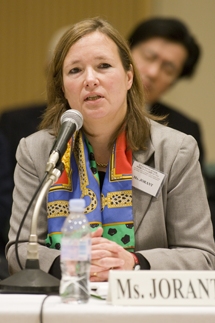
- I would like to refer to a different aspect with regard to the discrimination under the NPT regime. For example, when the Urenco's facility was to be built in France, many issues needed to be resolved in order to make it subject to IAEA safeguards. If the facility had been built in Germany, it would have been automatically placed under IAEA safeguards and there had been no problem. This can be a case of reverse discrimination against a nuclear weapons State. Also, both the United Kingdom and France are subject to EURATOM safeguards, but both are asked to conclude a specific agreement to ensure that materials and equipment to be transferred from Japan and other non-nuclear weapons States shall not be used in their weapons programs.
- This is only a proposal, but in the future, a sensitive nuclear facility under multilateral management to be set up in a nuclear weapons State may be placed under IAEA safeguards and costs involved in safeguards implementation may be borne by the countries involved. It could also be an idea that, unlike measures under the usual voluntary offer safeguards agreement, a country should be asked to commit to not removing its facility outside the safeguards regime once it has been made subject to safeguards. Another idea may be to increase efficiency of safeguards through an approach at the national level.
(Carter)
- It can be said that nuclear policies of nuclear weapons States have never been more transparent in the last 30 years. Inequality does exist, and a multilateral control over nuclear fuel cycle is one solution to this problem. What may become an issue is how to sell such concepts to customers, and it would be necessary to emphasize non discriminatory features of various proposals.
(Endo)
- On behalf of a non-nuclear weapons State, I believe that the NPT is a discriminatory treaty. Compared with legal obligations imposed on non-nuclear weapons States, what is imposed on nuclear weapons States is the commitment to disarmament - not merely a moral obligation. Japan accepted such a discriminatory treaty only for the good cause of preventing the emergence of any new nuclear weapons State by the NPT. It is impossible to overcome the inequality under the NPT regime, and this is why, I believe, nuclear weapons States should continuously make practical disarmament efforts, so as to reduce the sense of unfairness through such disarmament efforts.
(Okazaki)
- In relation to the inequality in terms of safeguards, I believe it should be possible to substantially relieve unfairness in safeguards by promoting an FMCT discussion.
(Ivanov)
- The International Uranium Enrichment Centre will be subject to IAEA safeguards and costs involved will be borne by Russia.
- In addition, Russia has a problem of disposition of weapons-grade plutonium. It is assumed that the BN800 would be placed under safeguards when it starts being used for disposition of plutonium from dismantled nuclear weapons. This will be a new area of activity for the IAEA and will thus be beneficial.
- In addition, cooperation between NPT signatory countries should be split into two categories in its consideration. When such cooperation is limited to nuclear power generation, then there would be no problem of nuclear proliferation. However, cooperation on nuclear fuel cycle requires a set of specific rules.
[Issue 6: How do we evaluate nuclear cooperation with non-NPT States?]
(Stratford)
- I was in charge of negotiations with India for the U.S.-India Nuclear Cooperation Agreement, and am now negotiating about implementation of reprocessing arrangements. There is a misunderstanding that the U.S.-India nuclear cooperation is a breach of the NPT, and this is incorrect! Article III, paragraph 2 of the NPT does not require application of comprehensive safeguards to exports of nuclear materials and equipment - it only requires that such materials and equipment should be subject to IAEA safeguards. Among the other issues is the question of whether policies are good or bad, but would it be appropriate to leave those countries, which have been outside the NPT regime for the last 30 years and which do not intend to give up nuclear weapons for the time being, where they are for the next 30 years? In order to promote this cooperation, factors taken into consideration were: (1) India is a major country with the population of one billion people, (2) it is a democratic country, (3) India has acquired its nuclear weapons not in an unlawful manner, (4) there has been no case reported of nuclear proliferation originated from India, and (5) the possible environmental impact in the case where India's electricity demand is to be met by the use of fossil fuels.
- Prior to the conclusion of the U.S.-India Nuclear Cooperation Agreement (signed into U.S. law in October 2008), many arrangements had been made, including the U.S.-India joint statement on nuclear cooperation (July 2005); agreement on Separating Indian Military and Civilian Nuclear Facilities (March 2006); the U.S. domestic law that allows cooperation with India (the Henry J. Hyde United States-India Peaceful Atomic Energy Cooperation Act of 2006) came into effect (December 2006); and approval by the Nuclear Suppliers Group (NSG) (September 2008). As the NSG guidelines do not impose legal obligations, one of options was to avoid the NSG. However, we took political obligations under the NSG guidelines very seriously and took the matter to a forum of 45 countries to give them assurance.
- Having been isolated in the last 30 years in the nuclear business, India does not fully comprehend nuclear business rules. It is necessary for it to learn step by step over the course of the time.
- There is an example of politically difficult questions being resolved by adopting a practical approach. India pledged to implement its export control in compliance with the NSG guidelines. However, as it is not a NSG member, India at first resisted the idea of revising its domestic laws to reflect the guidelines that are frequently revised at the NSG. It was therefore decided that the NSG Chairman would organize yearly outreach activities to explain to India and other non-NSG Member States the proposals for a revision of its guidelines, and the guidelines have been revised accordingly*2. From this example, I believe that it would be possible to resolve other issues related to the U.S.-India nuclear cooperation through pragmatic measures.
(Endo)
- On the issues related to nuclear cooperation with India, Japan was involved in discussion on two fronts, i.e., discussion at the IAEA Board of Governors on the agenda item concerning a nuclear safeguards agreement; and discussion at the NSG.
- However, it would be extremely difficult for Japan to follow the example of the United States and conclude an agreement with India. When considering cooperation with India, India's ratification of the CTBT should be a minimum precondition. At the moment, it is hard to expect India to sign and ratify the CTBT, but ratification of the CTBT by the United States would give major momentum to efforts to encourage ratification by India and China. In such a case, the government of Japan may be able to consider possible nuclear power cooperation with India.
[Questions and answers session with the general audience, and comments]
(Nuclear cooperation between the United States and India)
(general)
- The purpose of the NPT is to prevent the emergence of any new nuclear weapons States, but India and Pakistan carried out their nuclear tests. I believe that, in this context, building up nuclear power cooperation with India would have a negative impact on relations with North Korea and other countries of concern. What is the view of the United States on this?
(Stratford)
- The U.S.-India Nuclear Cooperation Agreement was not necessarily positively supported at the NSG - it is more appropriate to say that it was "allowed to happen". However, as part of the U.S. administration as well as in my personal capacity, I believe that this agreement was the right decision and its value will surely be appreciated in the future. I visited India four times during the fourteen month negotiation period, and I could not help being taken aback by its poverty. India needs nuclear energy, which is clean and does not emit carbon dioxide.
- India is not a party to the NPT, so the question of a breach of the NPT will not arise. However, it could be said that the international community at the time was trying to emphasize the dividing line between nuclear weapons States and non-nuclear weapons States and to put itself on the side of the latter.
- Issues surrounding North Korea are difficult and I do not think the U.S.-India Nuclear Cooperation Agreement would have any impact on them.
- India has not expressed its intention to ratify the CTBT, nor has it pledged under the bilateral agreement not to conduct a nuclear test. However, if you read carefully the text of the U.S.-India Nuclear Cooperation Agreement, you would realize that the United States is entitled to request India to return materials and equipment it has provided in cases where India conducts another nuclear test. This reflects that the U.S.-India agreement is not only a carrot approach but also a stick approach in that a penalty is imposed on India if it conducts a nuclear test. In the sense of making it more difficult for India to carry out a nuclear test, the agreement contributes to nuclear nonproliferation.
(general)
- I believe that India interprets the withdrawal from cooperation differently from the United States. India interprets that even if the United States withdraws from cooperation, it will simply need to look for other suppliers. Does the United States have a different interpretation in this respect?
(Stratford)
- I would like to refrain from making comments on the interpretation applied by India. If you carefully read the agreement, it is evident that the United States has a right not to be confined. With regard to a response in the case of a nuclear test being carried out by India, it is phrased that the U.S. government will carefully examine the background of the nuclear test. If it finds that perception gap with India has not been resolved, or if it judges that this is a problem which can not be resolved, then it is possible to cease agreement. The reason for this phrasing is to give the President a scope of flexibility to make a political judgment, as the issue of nuclear testing is highly sensitive in a political sense.
(Inequality under the NPT regime)
(general)
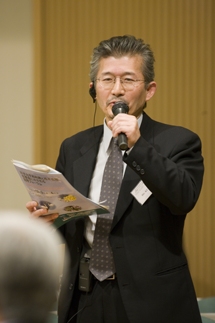
- It may be impossible to eradicate inequality altogether, but in the sense of reducing inequality, nuclear disarmament and the FMCT are important. Also, safeguards in non-nuclear weapons States for the purposes of detecting technology transfer and the voluntary safeguards offer of nuclear weapons States have completely different features. Imposing the obligation on nuclear weapons States to account for nuclear materials exported to, or imported from, non-nuclear weapons States will be effective in the sense that it would contribute to preventing technology transfer by non-nuclear weapons States.
- It is necessary to keep safeguards at the same level, but safeguards approaches to be taken by individual States may well be discriminated from one another in reference to various domestic circumstances.
(Kuno)
- I have acknowledged the importance of "accountability" and "efforts to explain" concerning the issue of inequality. I have also learned many things once again through today's discussion. I would like to request that nuclear weapons States make further efforts to increase their "accountability".
(Murakami)
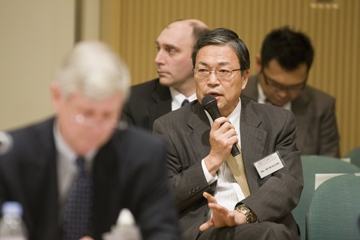
- The agreement sets out two specific purposes of inspections in nuclear weapons States. One is to verify that the diversion of nuclear materials from civil to military use will not occur. Another is to gain experience of inspecting specific nuclear fuel cycle facilities (something beneficial for non-nuclear weapons States, such as new technologies, may emerge as a result thereof). There are cases where nuclear materials transferred from Japan, in compliance with the UK-Japan Nuclear Cooperation Agreement and the Franco-Japan Nuclear Cooperation Agreement, are placed by the IAEA under its safeguards. It has been pointed out that the frequency of inspections carried out in Japan is high. However, looking from outside, Japan has already acquired a set of necessary elements, i.e., Pu, nuclear fuel cycle facilities and engineers. What is missing in order to manufacture nuclear weapons is the will of the State. It is necessary to understand that there exists a gap in perception between those looking at the issue from the inside and those from the outside. Consideration should also be given as to why only Japan of all non-nuclear weapons States has been successful in operating the closed cycle on a commercial scale, and other nations are unable to do so.
(3Ss)
(general)
- It is insufficient to point out the importance of the 3Ss. It may be necessary to formulate guidelines to ensure 3Ss.
(Taniguchi)
- While the authority of the IAEA in relation to its safeguards is explicitly stipulated in the IAEA charter, on the issue of safety and security, the IAEA is allowed to carry out only advisory activities at the request of its Member States; the problem arising therefrom is that the authority of the IAEA on each element of the 3Ss is inconsistent. A trend has been seen to encourage industries in supplier countries to formulate a code of conduct so as to ensure compliance with the 3Ss (facilitated mainly by Carnegie), but there has been no consensus made within the IAEA as to whether the IAEA should play a central role in ensuring 3Ss. Nevertheless, the 2020 Scenario Report*3 compiled by the World Economic Forum in 2008 referred to ideas related to 3Ss.
(Nuclear disarmament)
(general)
- What are the time frame and the objective for nuclear disarmament?
(Carter)
- Mr. Brown, Prime Minister of the United Kingdom, has not indicated a time frame. It depends on the international security environment.
(Human resources development)
(general)
- Many of students who study nuclear engineering will go to work in different sectors. It is important to make the nuclear industry attractive to younger generations.
(general)
- I want to point out two issues with regard to human resources development: (1) Instead of putting the focus on the number, we should also consider the quality. In other words, the important thing is how to educate a small number of new people who have come to work in the nuclear industry into a pool of highly qualified human resources. (2) Give students the privilege of communicating with various people from various countries, regardless of State policies. It is important that students are given such an opportunity so as to nurture their minds. I believe that the value of such minds will become apparent in intergovernmental negotiations that take place in 20 to 30 years' time.
(Carter)
- The situation in the United Kingdom on human resources development is that young male workers in particular tend to take up employment in business management, not in the nuclear industry. The reason behind this trend seems to come down to particular circumstances in the nuclear industry where there is little opportunity for young people to get involved in the decision making process. Creating an attractive environment for younger generations is necessary.
- Nuclear is becoming hot from the business and scientific perspective, and this trend is being reflected in courses offered at university.
(Stratford)
- The easiest path to human resources development is to provide scholarships to young people and to create employment opportunities. The U.S. Navy provides free education to educate experts in nuclear submarines. It is difficult for the civil nuclear industry to educate nuclear experts.
(Jorant)
- A long-term perspective is necessary in consideration of issues of human resources development in the nuclear sector. It is also important to send out messages to appeal the positive aspects of the nuclear industry, such as employment opportunities, political assistance and other privileges.
(Tanaka)
- Young people are concerned that approaches being taken to nuclear power by the government and the industry in Japan are not transparent. It is important to send a message to young people through this kind of forum.
(Thorium fuel cycle)
(general)
- Thorium should be included in the consideration from the perspective of nuclear nonproliferation.
(Ivanov)
- Uranium-233 can be used for constructing nuclear weapons and its nuclear proliferation is the same with the uranium-plutonium cycle. It can therefore be a good subject for study, but the priority should be placed on the fast breeder reactor (FBR).
(Okazaki)
- Thorium is not intentionally avoided. It is desirable to conduct discussions in an open manner.
(Stratford)
- It takes a long time to establish a thorium cycle, as with nuclear fusion. It is not desirable, either, in terms of nuclear nonproliferation. It will require plutonium driver fuel for one reason and it will produce uranium-233, (8kg is the significant quantity for U-233), for another.
<< Summary of the round-table discussion 1 >>
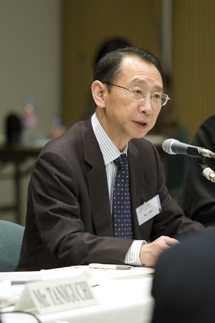
Issue 1: How do we sustain the promotion of nuclear energy and its address challenges?
An in depth discussion was held on how to promote nuclear power in new nuclear nations. The importance of the role to be played by the IAEA in assisting these new nuclear nations, as well as the fact that human resources development in the nuclear sector is a problem common to all countries, were acknowledged.
Issue 2: How do we support emerging nuclear nations in securing the 3Ss?
Discussion was held on the implementation of 3Ss initiatives in development nations and the roles of Japan during that process. The need to consider specific measures for the implementation of 3Ss initiatives, as well as the importance of informing developing countries of the benefit of accepting the 3Ss, were pointed out. It was also emphasized that Japan was expected to contribute to 3Ss initiatives.
Issue 3: How effective is multilateralization of the nuclear fuel cycle from the perspective of nuclear non-proliferation?
The concept which incorporates not only the front-end but also the back-end is effective.
Issue 4: How do we promote universal adherence to the Additional Protocol?
Discussion was held on the topic of the Additional Protocol and how to make it more universal. It was pointed out that there is a need to raise awareness of the Additional Protocol as an indispensable tool for detecting undeclared activities and that it could be useful for non-nuclear weapons States to ensure the transparency of nuclear activities and the efficiency of safeguards.
Issue 5: How do we overcome the perception of inequality in the NPT regime?
The perception gap between nuclear weapons States and non-nuclear weapons States on this issue became evident. Nuclear weapons States expressed a view that the notion of the NPT being unfair was wrong and that it would be important to publicise initiatives being undertaken by nuclear weapons States themselves. On the other hand, non-nuclear weapons States emphasized that nuclear weapons States were obliged under the NPT to make nuclear disarmament efforts, which would work to relieve the sense of unfairness. Furthermore, nuclear weapons States should publicize these efforts and be more transparent.
Issue 6: How do we evaluate nuclear cooperation with non-NPT States?
As a practical example, Mr. Stratford who had led the American delegation for negotiations with India explained the background of the agreement reached between the United States and India on nuclear cooperation, which was followed by discussions with participants on the impact of the agreement on the nuclear nonproliferation regime. A representative from Japan pointed out that in order for Japan to commit itself to nuclear cooperation with India, Indian ratification of the CTBT would be a minimum requirement.
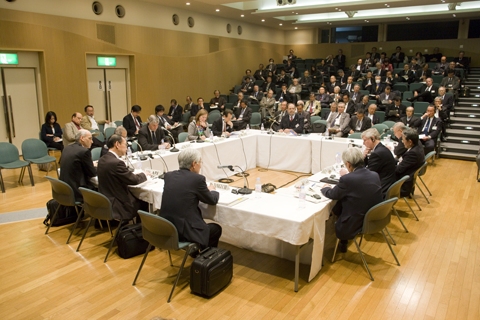
First day's Closing Remark
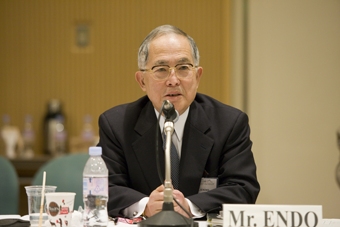
Mr. Tetsuya Endo, Senior Adjunct Fellow, The Japan Institute of International Affairs (JIIA)
- Greetings on behalf of The Japan Institute of International Affairs, one of organizers of the Forum
- A new style of debate, i.e., round-table discussion, was successful in facilitating constructive discussion.
- Appreciation of the panelists and the general audience was expressed.
Round-Table Discussion 2
"Safeguards, nuclear security and proliferation resistance"
Attendance:
- Mr. Kaoru Naito (Moderator)
- President of Nuclear Material Control Center, Japan
- Mr. Odilon Antonio Marcuzzo do Canto
- Secretary, Brazilian-Argentine Agency for Accounting and Control of Nuclear Materials (ABACC)
- Ms. Caroline Jorant
- Director, Nonproliferation & International Institutions, AREVA, France
- Mr. Wan Ki Yoon
- Principal Researcher, Korea Institute of Nuclear Nonproliferation and Control (KINAC)
- Mr. Valentin Ivanov
- Professor, Russian Academy of Science
- Mr. Ronald Cherry
- Energy Attaché, U.S. Embassy Tokyo/Director, U.S. Department of Energy Japan Office
- Mr. Ike Therios
- Argonne National Laboratory, U.S.
- Mr. Joseph F. Pilat
- Los Alamos National Laboratory, U.S.
- Mr. Robert Bari
- Brookhaven National Laboratory, Co-Chair, Proliferation Resistance and Physical Protection Evaluation Methodology Expert Group, Generation-IV International Forum (GIF), U.S.
- Mr. Kenji Murakami
- Former Director, Operation C, Department of Safeguards, IAEA
- Mr. Naohito Kimura
- Director, Japan Safeguards Office (JSGO), Ministry of Education, Culture, Sports, Science and Technology (MEXT)
- Mr. Yoshihiro Nakagome
- Vice President, Japan Nuclear Energy Safety Organization (JNES), Professor emeritus, Kyoto University
- Mr. Masao Senzaki
- Director, Nuclear Nonproliferation Science and Technology Center (NPSTC), Japan Atomic Energy Agency (JAEA)
- Mr. Yusuke Kuno
- Professor, Nuclear Nonproliferation Research Laboratory of the Department of Nuclear Engineering and Management, School of Engineering, University of Tokyo, Deputy Director, NPSTC, JAEA
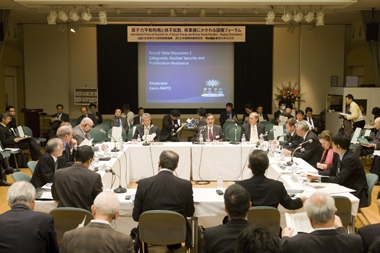
(Naito)
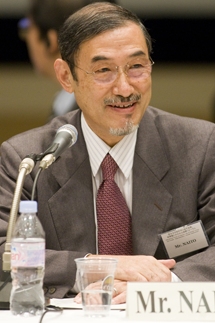
- In this session, the summary of the three issues prepared by the IAEA Secretariat, i.e., measures to improve effectiveness and efficiency of the IAEA safeguards, role of the proliferation resistance, and enhancing nuclear security, will be examined in ten-minute presentations by individual panelists. The floor will then be open for discussion based on the questions prepared in advance.
[Issue 1: Challenges of safeguards]
(Murakami)
- International safeguards has a 50-year history and have been enhanced after all sorts of troubles and difficulties. At the moment, the enhanced safeguards are being applied, and it is necessary to evaluate these from the viewpoint of whether enhancement has been implemented efficiently. When the new IAEA Director General, Ambassador Amano, took office, he referred to the need to give priority on responding to new tasks the IAEA was asked to take on. The purpose of its safeguards is to implement measures to ensure the accuracy, i.e., no transfer of nuclear materials, and the integrity, i.e., no undeclared activities. Seven safeguards related issues have been listed, as follows:
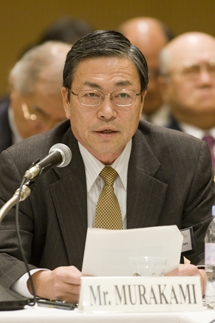
- Global nuclear renaissance and increasing workload:
The increase in the number of new nuclear nations and the increase in inspection work due to the wider use of MOX fuels are anticipated. - Safeguarding innovative fuel cycle facilities and technological development:
This concerns safeguards to be applied to future facilities and remote inspections being discussed at the GEN-VI and INPRO. In order to respond to automation of the process and to the facilities with little accessibility, it would be necessary to conduct inspections in an innovative manner by introducing the latest technologies. - Global proliferation risk and proliferation network:
Responses to the issues concerning Iran, North Korea and nuclear trafficking. How to detect undeclared activities as soon as possible and to exercise nonproliferation capacity? - Maintaining adequate and sufficient legal authority:
Making the Additional Protocol more universal, and approaches to non NPT signatories. In spite of existing safeguards agreements, if only insufficient information is made available, such as in the case of Iran, the whole picture will not emerge. It is also necessary to consider further enhancement measures, such as an "Additional Protocol (AP) plus". - Possible new verification roles and missions:
If there is progress in nuclear disarmament and the Fissile Material Cutoff Treaty (FMCT), this would be a new role to be played by the IAEA. - Improve effectiveness and efficiency of verification capabilities and operations:
How to improve effectiveness and efficiency of inspections? Improve information analysis in the new safeguards called "information driven safeguards", effective use of national and regional inspection regimes, partnership between the European Atomic Energy Community (EURATOM) and the IAEA, initiatives on safeguards quality control. - Effective resource development and management:
Under the current IAEA budgets, it is difficult to carry out all activities. How to make effective use of limited human resources, how to educate new personnel?
(Naito)
For the purposes of efficient discussion, I have prepared six questions listed below. Comments are welcome in reference to them.
- How to make the NPT safeguards, Additional Protocol and integrated safeguards more universal?
- What could be done to implement safeguards more effectively and efficiently? Any ideas for the evolution of safeguards? Research and development? International cooperation? Regional safeguards? Safeguards culture? Safeguards by Design?
- What are the limits to safeguards? How can such limits be overcome?
- In the next-generation cycle, would there be means to reduce the economic impact of safeguards?
- Should nuclear weapons States bear the burden of safeguards as with non-nuclear weapons States?
- What human resources are involved in safeguards?
(Yoon)
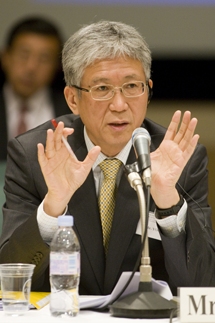
- The Asia Pacific Safeguards Network (APSN) was initiated by Australia, and South Korea has rendered its support to it. "ASIATOM" and other related concepts had been thought of in the past, but the APSN is the first multilateral initiative on safeguards achieved in the Asian region. Originally, it was called Asia Pacific Safeguards Association (APSA), but some considered that an "association" may be too stringent and the word was replaced with the more flexible "network". APSN was inaugurated on 1st October 2009 and the first official meeting is scheduled in Indonesia in April next year (2010). Australia, China, Canada, Indonesia, Japan, South Korea, Malaysia, Singapore, Thailand, Vietnam, and the United States are expected to attend. The IAEA may attend as an observer.
(Cherry)
- The Next Generation Safeguards Initiative (NGSI) in the United States is a comprehensive initiative to meet the needs for safeguards expected in the next 25 years. It was originally proposed by the United States but now it has become an international project with various aspects, i.e., policies, outreach, technical development, training, and human resources development, with a view to responding to safeguards related issues and continuous technical improvement. In particular, human resources development is the most pressing issue. The first meeting was held in Washington, D.C. in September 2008. The second meeting was held in Tokai in October 2009 in cooperation with the Japan Ministry of Education, Culture, Sports, Science and Technology (MEXT) and the JAEA
(do Canto)
- Latin America is the first region where a nuclear weapon-free zone treaty came into force. In the region, Argentina and Brazil had been engaged in nuclear activities and both put the Guadalajara Agreement for the Exclusively Peaceful Use of Nuclear Energy into force in 1991 and also established the common agency for accounting and control, ABACC. The Quadripartite Safeguards Agreement between the IAEA, ABACC, Brazil, and Argentina was entered into force to confirm that nuclear materials for peaceful use are not transferred to non-peaceful activities. The ABACC pays attention not to duplicate IAEA activities and carries out its own inspections. A Secretary, a Deputy Secretary as well as principal officers are selected from both Brazil and Argentina, and 90 inspectors carry out inspections in both countries on a mutual basis. I believe it is possible that a strong regional agency for accounting and control can take over part of the future role of the IAEA and respond to budget increases for the IAEA. In the area of research and development, we cooperate with EURATOM and the United States, and cooperation in the area of training is also being considered.
(Jorant)
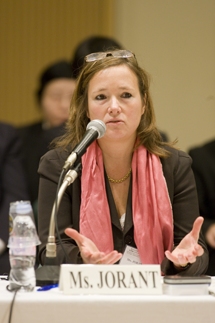
- Let me explain about EURATOM. It was established in 1957 based on the EURATOM Treaty. It was initially composed of six countries, but today it has 27 Member States. The EURATOM Treaty is composed of several chapters on research, international cooperation, supply, safeguards and others. The EURATOM Safeguards Office is to confirm non transfer of declared nuclear materials and to carry out activities based on the bilateral agreements. There are three agreements with the IAEA. The EURATOM safeguards are applied to both nuclear weapons States and non-nuclear weapons States indiscriminately and a report is submitted to the IAEA. The office is based in Luxemburg and funded by the European Commission (EC). The EC has its own research and development base and undertakes research and development activities. The European Safeguards Research and Development Association (ESARDA) also carries out technical development and is actively engaged in academic exchange with institutions in the United States.
(Kimura)
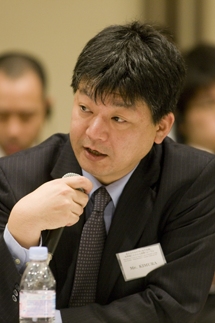
- Japan's safeguards systems are applied according to the comprehensive safeguards agreement with the IAEA signed in 1977, and Japan has undertaken various cooperative programs. In Japan, safeguards are applied to large, complex facilities, accounting for 30% of global inspection (IAEA) workload. Full scale operation of the Rokkasho Reprocessing Plant (RRP), resumption of Monju's operation, and construction and operation of JMOX are scheduled in the future. It is thus necessary to further increase the efficiency of safeguards without diminishing its effectiveness. In order to do so, a strategic plan for sustainable safeguards in Japan has been formulated. The strategy aims to ensure sustainable safeguards in Japan and to share knowledge with emerging nations. The strategy is composed of a plan to establish the increased domestic safeguards systems, concepts and approaches, technical development and human resources development. The IAEA plans to apply State-level comprehensive safeguards to Japan toward 2010, and Japan has rendered its support. For this purpose, and from the perspective of how Japan should support IAEA inspections, consideration has been given to an idea to derive so-called "State's Findings" by Japan on its own to be submitted to the IAEA as a proof of non-transfer of nuclear materials. We hope to cooperate with the international nuclear nonproliferation regime through these activities.
(Ivanov)
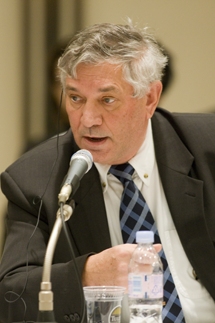
- Under a new national program, Russia plans to apply new generation technologies for the FBR development, including nitride fuel and dry reprocessing technologies. In this context, cooperation with the IAEA could be useful. It is important to develop safeguards to be applied to future fuel cycles.
(Murakami)
- Safeguards By Design is to start the application of safeguards at the design stage and to increase efficiency of safeguards. For example, if the identification code of composite fuel material could be used throughout the whole process line from the manufacturing phase, it would be useful in terms of traceability (or "continuity of knowledge"). Workshops and support programmes are being considered. Part of the process may be not directly accessible in the future due to radiation, and it is therefore important to ensure that designers fully understand safeguards. Work continues in collaboration with the GEN-IV and INPRO, which should be useful for designers.
(Pilat)
- Safeguards have evolved over the last 40 years or so in order to respond to various challenges and political issues, and it is necessary that these continue to evolve in the future. Concerning future fuel cycles, it would be an issue to be considered as to how to respond to the increasing throughput (amount treated in the process), high radiation, difficult-to-handle materials with high temperature, heterogeneous materials, and mixture of solid and liquid materials. It is important to build up research and development capacity in areas which have been completely unimaginable so far. In addition, it is important to ensure technical development in and wide international cooperation across, major nations, i.e., France, Russia, the United States and Japan. The last 10 years or so have depended on the old technology, and it is high time that we started to revive research and development of safeguards. Research and development initiatives should be reviewed in this context. Make use of highly capable experts in Japan, France, Russia and the United States, and solutions to be expected or unexpected challenges should be easily derived therefrom.
(Senzaki)
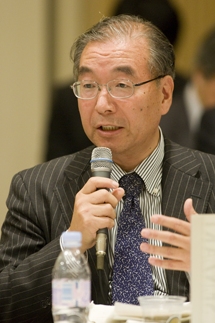
- A workshop was organized in Tokai with the IAEA in November, to discuss research and development of new technologies. The JAEA, responsible for implementation of research and development and being placed under the safeguards regime, intends to increase the efficiency of existing technologies. Application of the integrated safeguards to nuclear fuel cycle facilities first took place in Japan. In August last year, the Japan Atomic Energy Agency Tokai Research and Development Center, composed of a reprocessing plant, a MOX fuel fabrication facility and other research and development facilities, came under the integrated safeguards regime. This led to a substantial reduction in workload of inspectors, but the workload on the side of the inspected has not decreased. In consideration of circumstances in new nuclear nations, it would also be important to achieve a reduction in workload at facilities, and the Japan Atomic Energy Agency is working to develop technologies for this purpose.
- On the issue of making safeguards more universal, it is necessary to explain to non signatories to the Additional Protocol (AP), work, cost and human resources required at the time of the AP coming into force as well as the benefit of integrated safeguards, through discussions and seminars organized for some new nuclear nations, including Vietnam and Thailand. It is important to introduce the initiatives undertaken by Japan in the past as best practice examples. It is important to fully understand the needs of our counterparts.
(Kuno)
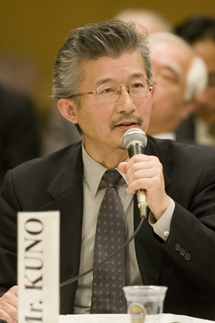
- I support robust safeguards, but there are the limits to safeguards. The purpose of safeguards is to ensure integrity and certainty, but safeguards are not perfect. Some countries have withdrawn from the safeguards regime, and others are looking for loopholes in safeguards agreements. In addition to the limits of the regime, there could be limits in a technical sense. For example, processing large amounts of plutonium, could result in large measurement uncertainties, which may be difficult to deal with by traditional safeguards measures. One idea proposed for addressing this is proliferation resistance, which will be discussed in the next session. This is a means of developing advanced technologies in order to make diversion of material more difficult. Current safeguards based on the accounting and control concepts is fundamental, but the greater efficiency of safeguards could be achieved, not only by accounting for nuclear materials, but also by confirming that no undeclared activity is being undertaken, through remote monitoring and solution monitoring to increase the transparency of nuclear activities and ensure non-existence of irregular use of nuclear materials. Consideration should be given to the evolution of safeguards.
(Jorant)
- Issues raised in these questions are important in the sense that all activities will enhance safeguards. This applies to international and regional cooperation. It should be possible to derive an independent conclusion without additional inspections. It is important to ensure that there is a system which makes it possible to conduct an inspection at any time in any place. Issues taken up by the Standing Advisory Group of Safeguards Implementation (SAGSI) include not only technical development but also political and environmental implications. A multilateral approach should contribute to making effective use of human resources. Early settlement of problems will become difficult if the industry becomes dependent on remote monitoring or associated technologies, for example, inspectors would have difficulty in responding to a minor problem on the spot when it arises; it is therefore important to consider possible back-up measures in parallel.
- From the perspective of economic implications, the "20/20 Vision for the Future"*4 (a report compiled by the World Economic Forum in 2008 on issues facing the IAEA as well as its status in 2020) noted that inspection workload would increase pro rata with an increase in the number of facilities. However, most of these facilities should be light water reactors (LWR) and new technologies may help simplify the safeguards procedure; it is thus feasible that inspection workload may not increase substantially. A project for reactor decommissioning may also provide a good opportunity to assess not only negative aspects, but also whether the hold-up time and measures taken previously have been appropriate.
(Cherry)
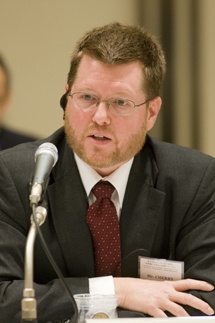
- On the issue of human resources development, it is important to organize various training courses at various levels. With regard to the Next Generation Safeguards Initiative (NGSI), workshops and training courses at various levels, as well as a summer school at a national laboratory, have been organized: In some cases, instructors will be sent to universities to organize programs. The scope of training courses for the IAEA and its Member States is being expanded.
- It is necessary to evolve safeguards and to make effective use of resources, but at the same time it is necessary to consider what can be done or must be done now. Special inspections within the IAEA's existing terms of reference are an example. Information access has become more important as a tool.
(Kuno)
- There is a gap in arguments about whether inspections of nuclear weapons States are necessary. In consideration of methods which would not impose additional burden on the IAEA, as well as of elements of fairness, facilities making peaceful use of nuclear materials should be ready for an inspection even if they are not subject to inspection.
(Murakami)
- Within the IAEA, in principle, discrimination is not allowed in the application of IAEA safeguards. However, for example, in Iran safeguards are being applied to activities which go beyond the scope of those placed under the normal safeguards regime. "Differentiation" is necessary in consideration of the safeguards system, transparency, cooperation, reliability of technologies and provided information of a country concerned.
- An approach to nuclear weapons States focused on the quality, not on the frequency, is important. One idea is to increase the number of facilities in nuclear weapons States subject to inspection and to perform inspections at random. It is important that nuclear nations take the lead for technical development.
[Questions and answers session with the general audience, and comments]
(Measures to improve effectiveness and efficiency of the IAEA safeguards)
(Scheinman, participant for the round-table discussion 3)
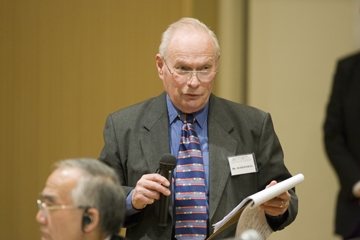
- I was an instructor in the training course in the United States. The level of students is rising. They seem to regard the training as part of their career path.
- Measures against non compliance are necessary. The question of whether the Additional Protocol is sufficient may well be reviewed in reference to what is going on in Iran with a view to establishing a more robust system. I believe that, following the revelation of undeclared activities in Iraq, there has been a change in the inspection culture. It is important to keep "doubts" in mind when carrying out inspections.
(general)
- Development of new safeguards technologies is still insufficient. I was involved in the safeguards procedure in the past as part of the government. At the time, in relation to the automated process at the Plutonium Fuel Processing Facility (PFPF), the IAEA set a very high standard for safeguards, and we developed a system to rationalize automatic verification. When the automated process was introduced at the facility, it became necessary to authenticate computerized equipment, and we took a decision to assign the work to a national laboratory under the U.S. Department of Energy (DOE). International cooperation is important to increase transparency. Safeguards at the Rokkasho Reprocessing Plant (RRP) were considered at LASCAR*5 (Large scale reprocessing plant safeguards), and NRTA*6 (Near real time material accountancy) was agreed as a result. International cooperation with reliability is necessary. The IAEA needs to revise its inspection methods for inspection using new technologies.
(Pilat)
- In addition to technologies to detect undeclared activities, it would be necessary to make effective use of the existing authority, e.g., to invoke the right to conduct a special inspection. New authority should also be considered.
[Issue 2: Role of proliferation resistance]
(Kuno)
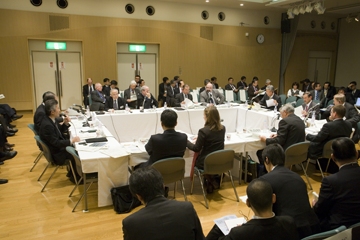
- It is important to raise proliferation resistance as a possible solution in response to the increase in the number of facilities and to the wider use of plutonium. In addition to making proliferation technically difficult, technical barriers (intrinsic barriers); safeguards and other statutory regulations (extrinsic barriers), are also part of proliferation resistance. Safeguards are the main extrinsic barrier. Specific methods include inspection of information about design, accounting and control, containment and surveillance, and high detection probability with the use of a detector. As for intrinsic barriers, measures should be taken to make nuclear materials difficult to access, difficult to treat, and difficult to divert, e.g., degrade the quality of plutonium; add high radiation components to deny access; and formulate it to release heat at temperatures too hot to easily handle. The goal of proliferation resistance is to discourage diversion and misuse of nuclear materials through these measures.
- Many discussions have been held throughout its history, and the issue of resistance was discussed at the International Nuclear Fuel Cycle Evaluation (INFCE)*7 launched in 1977. In the discussion, evaluation was made particularly from the perspective of proliferation. At the time the Tokai Reprocessing Plant was to start its operation, one of the main subjects was the question of "whether to go for the once-through fuel cycle (no reprocessing) or the plutonium recycle". At the time, the United States was advocating the once-through fuel cycle and that was one of the reasons for conducting the evaluation. Technical methods I have explained in my previous comments were also discussed then. The conclusion at the time was that though these methods might be very effective, they had limitations, and that safeguards should still be the main approach. Thereafter, the issue of proliferation resistance has been discussed at INPRO and GEN-IV, as well as in France, the United States and Japan. At the Como meeting*8 in 2002, the definitions and the underlying principles of proliferation resistance were discussed. Some articles argue that increased proliferation resistance would make it possible to raise the efficiency of safeguards.
(Naito)
For the purposes of efficient discussion, I have prepared five questions, as follows:
- What kind of technologies will contribute to increasing proliferation resistance;
- Relationship between proliferation resistance and safeguards - that of a trade-off or one that generates a synergetic effect;
- Would criteria be necessary for design of a system with high proliferation resistance;
- How high should proliferation resistance be increased to achieve a satisfactory level; and
- Would and could a system with high proliferation resistance be economically competitive?
(Yoon)
- With regard to technologies to increase proliferation resistance, there are various technologies and facilities; however, the concept of resistance needs to be looked at on a case-by-case basis. Many ways could be considered which may have policy implications, e.g., produce low grade plutonium and reduce the plutonium content, although the proliferation resistance should first of all be taken into account at the design stage.
(Ivanov)
- In order to increase proliferation resistance, remote technologies and automation are useful. It could be conceivable that a system without human involvement would be available in the future. Russia has been working since 1982 to develop technologies with high proliferation resistance. These technologies may not be appropriate for light water reactors. However, a dry reprocessing process, if used for production of fuel, can take fissile material and minor actinides*9 into the fuel. Application of this process can also reduce the transport distance.
(Bari)
- What is important in numerically quantifying parameters for proliferation resistance is to systemically and systematically conduct a study and evaluation. It is also necessary to apply what has been identified as a result thereof in such a way as to reduce the proliferation risk.
(Senzaki)
- The JAEA is undertaking the Fast Reactor Cycle Technology (FaCT) project to develop fast breeder reactor technology, in which proliferation resistance is regarded as one of main issues. As an intrinsic barrier, the mixture of minor actinides (MAs) is being considered to increase resistance, but it is necessary to take into account the balance with economic efficiency. The standard of resistance is also important in terms of how high its level should be. In relation to institutional barriers, some aspects of safeguards may be undermined by increased resistance; thus, research and development are necessary in this respect.
(Therios)
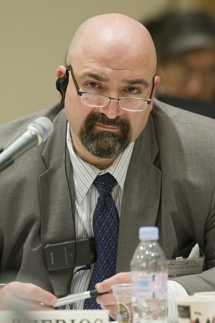
- With regard to the question of the relationship between proliferation resistance and safeguards, there are trade-offs in some cases and synergetic effects in others.
(Pilat)
- Increased proliferation resistance may make conditions for safeguards more difficult. Safeguardability, i.e., the ease of applying safeguards and the efficiency of safeguards, is important. It is important is to ensure that methods applied to make access to nuclear material more difficult, should not also reduce the detection capability of the safeguards system \ otherwise, proliferation resistance will not increase. In this sense, this is the trade-off relationship.
(Yoon)
- It is necessary to identify issues first of all. Combination of institutional measures and "Safeguards By Design" can generate a synergetic effect.
(Cherry)
- Institutional measures are important. It is also important not to rely too much on intrinsic elements, such as the composition of the nuclear materials and facility design with high proliferation resistance. In order to enhance proliferation resistance, safeguards and proliferation resistance approaches need to evolve concurrently. We should not focus only on the trade-off, but also expect a synergetic effect.
(Kuno)
- It is easy to talk, but how to implement in practice is what is important. A conservative world has already been established to deal with Safeguards, and only recently it has become possible to consider resistance in discussions about Safeguards by Design. Guidance may be necessary to allow discussion on proliferation resistance to take place in parallel.
(Murakami)
- Proliferation resistance is a step to enhance safeguards. Increased proliferation resistance does not mean the end of inspection. Safeguardability is important. The trade-off relationship exists. If proliferation were made more difficult than it is now, safeguards could be relieved substantially - this would be a benefit.
(Bari)
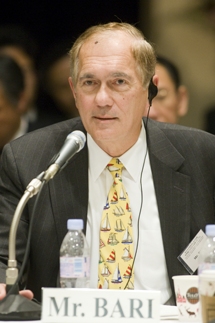
- Safeguards should be regarded as part of proliferation resistance in any context. Instead of putting intrinsic and extrinsic elements opposite to one another, safeguards should be regarded as something relevant to proliferation resistance.
- In order to achieve proliferation resistance, it is important to analyse in our studies, in relation to proliferation resistance and associated risks, what kind of response ability a State would have to have in order to directly deal with threats to national security, e.g., transfer and withdrawal, and derive solutions to match these conditions.
- With regard to the question of proliferation resistance criteria, especially high level criteria, then it would be necessary to involve many people; criteria should not be set exclusively by engineers.
(Senzaki)
- Criteria should not be set exclusively by engineers. Policy makers and users should also be involved. Economic efficiency is also important and, in this context, simply upgrading criteria may not necessarily be a solution. It is necessary to consider how the standard is set and how it would be reflected in the design. Discussion on criteria with due consideration of the balance is required.
(Jorant)
- Proliferation resistance should be considered within the context of a system, not from the perspective of individual technology or facility. The risk assessment is important and risks need to be assessed within the context of design bases threat (DBT)*10 and proliferation. The risk of having sensitive facilities and the risk of such facilities existing at a certain time in a certain country need to be considered. These risks should be reduced by the best means possible, and how to detect that something is happening, when something is taking place is also an important element. With regard to commercialized facilities, economic aspects also need to be taken into account.
(Kuno)
- A risk of a breakout is without doubt low in countries where safeguards are being thoroughly applied and where high transparency has been achieved. There would be no problem if proliferation resistance can be introduced in these countries in an economic manner. It would be important to consider the level of resistance to be introduced in countries in the case where it cannot. Some argue that safeguards should be sufficient.
(Pilat)
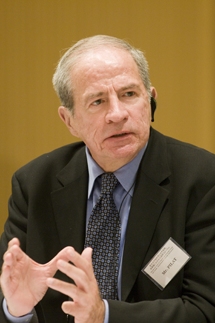
- Economic proliferation resistance may hard to find. We have to consider economic issues and reduce the risk of proliferation through necessary measures at the same time - this relates to how to promote safeguards effectively. Safeguards By Design has been discussed at the IAEA and in various forums, and it may make it possible to optimize the design and to reduce the costs of safeguards. It could be useful in economic aspects as well if transfer paths could be reduced by incorporating safeguards at the design stage, thereby increasing the effectiveness of not only safeguards but also the whole system.
[Questions and answers session with the general audience, and comments]
(Role of the proliferation resistance)
(general)
- I used to study issues of nuclear development by Iran. Iran would never be able to build nuclear weapons unless it comes to possess weapon-grade nuclear materials. In this context, what is the possibility of technologies which would make it impossible to produce weapon-grade nuclear materials?
(general)
- Does the proliferation resistance take into account a transfer not only by the State but by terrorists?
(general)
- A system with high proliferation resistance is in reality costly. How should proliferation resistance be introduced in developing nations?
(Kuno)
- With regard to reprocessing technologies, for example, it is technologically possible to not produce high purity plutonium appropriate for nuclear weapons. However, with the PUREX process having already been established, and in consideration of economic efficiency, economic and established technologies may be adopted eventually. In order for a method with high proliferation resistance to be selected, economic incentives are necessary.
[Issue 3: Enhancement of nuclear security]
(Nakagome)
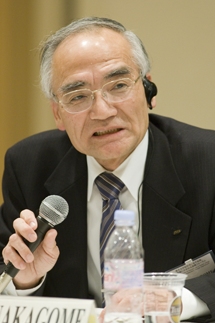
- Even in Japan, a technically developed nation, interest in nuclear security is unfortunately low. In this context, I am thankful for today's opportunity. I would like to explain seven global trends concerning security. First is the paper on nuclear security. The guidance is being prepared for publication. The IAEA is developing the paper as part of its Nuclear Security Series of publications, and publication of the basic document is scheduled in August 2010. The recommendation document to come under the basic document will be a trilogy scheduled to be published in 2011. With regard to guidelines and guidebooks, documents which rank lower than recommendations, half of the papers planned for publication have already been published or are being printed. The second is transport security measures. Transportation is said to be vulnerable, as it is carried out with limited equipment and personnel even without knowing the locality; therefore, how to strengthen security measures during the transportation process has become an issue. The third concerns security culture. Safety culture has been frequently referred to since Chernobyl, and security culture also needs to be considered on a global basis from now on. The fourth is the inspection of and response to nuclear smuggling, which has not been a great concern for Japan but which has become an international issue. The fifth is Security By Design. The sixth is the 3Ss (safety, security, and safeguards). The last one is the future of the World Institute for Nuclear Security (WINS)*11. I believe that these issues will be discussed at the security summit to be convened in Washington, D.C. in April 2010.
- In particular, the 3Ss have been discussed at the IAEA as well as in Japan. The 3Ss were referred to by then Prime Minister Fukuda at the G8 Summit in Hokkaido Toyako in July 2008. It is necessary to consider whether Japan should take initiative in security. In Japan, and within the Japanese conception, security is unconsciously included in the consideration of safety; this may be an obstacle to considering security independently. There is also the issue of the insider threat.
(Naito)
- For the purposes of efficient discussion, I have prepared three questions. The first question is "What are the urgent issues in, and measures for, enhancing nuclear security in individual States?". This may be relevant to security measures for radioactive material, security measures for the transport of radioactive material, measures to prevent illegal transfer of radioactive materials, measures against insider threats, promotion of the concept of Security By Design, cultivating a security culture, and early ratification of the Convention on the Physical Protection of Nuclear Material (CPPNM). The second and the third questions are "What kind of role is WINS expected to play?" and "What could be expected from the security summit to be convened in April next year?".
(Cherry)
- The most important challenge is the threat of nuclear materials being stolen by terrorists. In order to respond to this threat, ratification of the Convention on the Physical Protection of Nuclear Material (CPPNM), compliance with the INFCIRC/225 and acceleration of its revision, are important. It is important that Security By Design, relevant to proliferation resistance, should be reflected in the design in order to enhance security. Concerning the CPPNM, a bill was submitted to the United States Congress. However, as the Congress was adjourned thereafter, a new package is going to be submitted.
(Yoon)
- In South Korea, we do not think there is a particularly big challenge. However, we always make efforts to increase our capacity. At the moment, we are working on the Design Basis Threat (DBT) and are also involved in the revision of the INFCIRC/225. We hope that the security summit next year will provide the impetus for cultivating a security culture.
(Jorant)
- There is a serious concern about the security of radioisotopes, and it may be effective if a nuclear security culture could be cultivated for other materials. It would be difficult to apply Security By Design to radioisotopes. Transportation has never been a problem within France, but the security of international transportation needs to be considered. The CPPNM may be important for emerging nations, but the issue is more of the implementation of guidelines and measures. The WINS should be able to cultivate a culture in an efficient manner. It could also provide useful information when problems arise, and in this context, its role is important.
(Ivanov)
- In Russia, the majority of nuclear material is transported over long distance, and rather than security, measures to deal with environmental pollution and public opinion are necessary. As an additional measure to increase credibility, a reliable system to manage international transportation of nuclear materials is necessary, so as to identify the position of cargo and the amount of nuclear materials.
(do Canto)
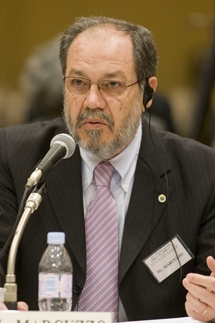
- The ABACC is not in charge of security but is interested in it, because of the synergy of 3Ss. In Brazil, the National Energy Commission is in charge of security issues, and is in compliance with international practices.
(Senzaki)
- In Japan, laws and regulations were revised and enhanced a few years ago in accordance with INFCIRC/225/Rev.4. Facilities are inspected and assessed by regulatory authorities every year and, if necessary, corrective measures are undertaken. Training is also conducted, involving security authorities. It was explained that the IAEA were producing documents to increase security, and we should respond to the IAEA initiative as soon as possible, including in issues related to transportation. The more nuclear development progresses, the more important transportation becomes. It is necessary in this context to consider how to defend ourselves from nuclear terrorism. The JAEA is studying transport security with the Sandia National Laboratories and believes that cost performance is also important. One of the study topics under the Japan-U.S. Joint Action Plan is the concept of Security By Design, which includes a review, which is currently in progress.
(Nakagome)
- Different countries have different ideas about security and therefore apply different regulations. Possession of guns is not allowed in Japan, and if, for example, a decision on this issue is defined in the CPPNM, then it would be difficult for certain countries to incorporate the international instrument into their domestic legal structures. As such, it is necessary in the discussion to take into account circumstances of individual countries.
- With regard to the security of radioisotopes, radioisotopes have been used from the perspective of accessibility. Nuclear materials have been placed under strict control for being raw materials for nuclear weapons. On the other hand, users may be taken by surprise with a sudden focus on the security of radioisotopes. Security By Design may be useful as a guideline, but it may lead to an overdesign. Discussion on this should take into account cost elements as well as the possibility of it making things rather difficult.
- Proliferation resistance may be effective in preventing nuclear materials being stolen, but what about its relevance to interference vandalism? In terms of proliferation resistance, nuclear materials mixed with highly radioactive substances may be a big attraction for interference vandalism.
(Pilat)
- How to assess threats is important. When threats are underestimated or overestimated, it may put the nuclear industry into a difficult position. As such, we need to take into account in threat assessment possible limits to what we can do. With regard to proliferation resistance, intrinsic disorders to be imposed by the State may be difficult to prevent, but vis-à-vis non-State actors, it is important also from the perspective of nuclear security.
(Cherry)
- There was a comment that the summit next year should be a good turning point. I expect that at the summit high level common understanding will be achieved and the direction will be set for preventing nuclear terrorism and smuggling of nuclear material. An ideal effective measure is to enhance the already introduced measures, such as the CPPNM and the United Nations Security Council resolution 1540, and to encourage all countries to be involved. These are what I expect as an outcome of the security summit next year.
[Questions and answers session with the general audience, and comments]
(Enhancing nuclear security)
(general)
- Comments were made as to how security should respond to threats. However, some countries are faced with more serious threats, whereas some other countries are faced with less serious threats. Information is fully disclosed in some countries, while it is not in other countries. It is therefore difficult to consider security in a single uniform way. International organizations are not allowed to discriminate, but I wonder how these gaps are being filled or whether these gaps have been taken into account.
(Jorant)
- How to define the responsibility, to raise awareness, and to provide an appropriate means in an appropriate manner, is important. Much is expected from the security summit in this context.
(Nakagome)
- I understand that discussion at the IAEA gives due consideration to regulations, cultures and religions in all countries.
(Murakami)
- As I have said in my previous comment, "differentiation" is the answer to the question raised. International organizations cannot discriminate, but may "differentiate" in consideration of circumstances of, and transparency measures being undertaken by individual countries, based on the common criteria.
(Cherry)
- I believe that "differentiation" should be possible. The WINS is constructive in the sense that various views and examples of best practices can be shared there. Solutions to the question of domestic standards could be found through discussions at the WINS. The concept behind the summit should be to encourage facilities and States to take part in the process of dialogue and to share as much information as possible, thereby drawing up a strategy to respond to a security risk. This should also be the objective of organizations such as the WINS.
<<Summary of the round-table discussion 2>>
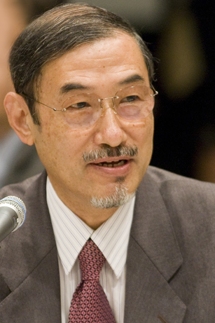
Issue 1: Challenges of safeguards
Comments were made on the effective use of the State System of Accounting and Control (SSAC) and the Regional System of Accounting and Control (RSAC)*12, making the Additional Protocol (AP) more universal, creating fairness between non-nuclear weapons States and nuclear weapons States, technical development including international cooperation, human resources development, the need of "differentiation", use of authority, and an Additional Protocol plus.
Issue 2: Role of the proliferation resistance
Research and development in proliferation resistance is important, and it is necessary to make safeguards more advanced through research and development. Comments were made on the need of criteria, and some considered that these should not be set exclusively by engineers. Proliferation resistance should be evaluated as a system, and economic efficiency needs to be taken into account.
Issue 3: Enhancement of nuclear security
The existing legal framework is important. It is important that all countries should put this framework into force and incorporate the IAEA documents in their domestic regulations. The nuclear security summit is important in terms of promoting a nuclear security culture. Some also pointed out the importance of security of international transportation and the importance of "differentiation".
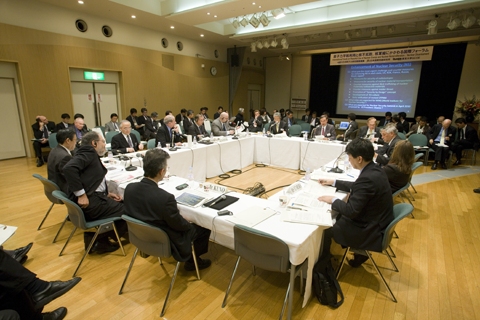
Round-Table Discussion 3
"Multilateralization of the Nuclear Fuel Cycle"
Attendance:
- Mr. Jor-Shan Choi (Moderator)
- Project Professor, University of Tokyo
- Mr. Yury Yudin
- Senior Researcher and project manager, United Nations Institute for Disarmament Research (UNIDIR)
- Mr. Odilon Antonio Marcuzzo do Canto
- Secretary, Brazilian-Argentine Agency for Accounting and Control of Nuclear Materials (ABACC)
- Mr. Zhongmao Gu
- Professor, China Institute of Atomic Energy (CIAE)/Vice Chair, Sciences and Technology Committee
- Ms. Caroline Jorant
- Director, Non-Proliferation & International Institutions, AREVA, France
- Mr. Kwang-Seok Lee
- Director, Division of International Studies, Korea Atomic Energy Research Institute (KAERI)
- Mr. Valentin Ivanov
- Professor, Russian Academy of Science
- Mr. Peter Carter
- Head, Nuclear Non-proliferation, Department of Energy and Climate Change, United Kingdom
- Mr. Joseph F. Pilat
- Los Alamos National Laboratory, United States
- Mr. Micah D. Lowenthal
- Director, Nuclear Security and Nuclear Facility Safety Program, National Academy of Sciences, United States
- Mr. Lawrence Scheinman
- Professor, Center for Nonproliferation Studies, Monterey Institute of International Studies, United States
- Mr. Takahiko Ito
- Commissioner, Japan Atomic Energy Commission/Advisor, Chubu Electric Power Co., Inc.
- Mr. Tatsujiro Suzuki
- Senior Researcher, Socio-Economic Research Center, Central Research Institute of Electric Power Industry/Visiting Professor, Graduate School of Public Policy, University of Tokyo
- Mr. Yusuke Kuno
- Professor, Nuclear Non-Proliferation Research Laboratory of the Department of Nuclear Engineering and Management, School of Engineering, University of Tokyo/Deputy Director, NPSTC, JAEA
- Mr. Yosuke Naoi
- Senior principal engineer, NPSTC, JAEA
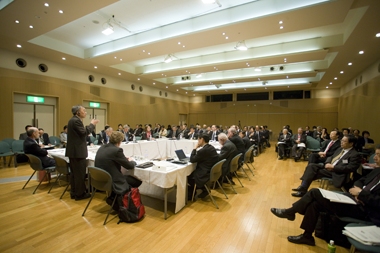
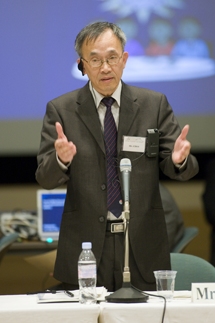
During the discussion on the nuclear fuel (low enriched uranium, LEU) supply guarantee and the multilateralization of the nuclear fuel cycle, focus was placed on the following issues:
- Would a fuel supply guarantee mechanism be effective in responding to the situation of supply disruptions caused by political reasons;
- Could a fuel supply guarantee mechanism, which requires States to waive the right to develop enrichment and reprocessing capabilities, be an effective incentive;
- Could the multilateral concepts of nuclear fuel cycle, which requires states to waive the right to develop enrichment and reprocessing capabilities, be an effective incentive;
- How could fairness be achieved in multilateralization;
- Could multilateralization contribute to finding solutions to issues related to nuclear nonproliferation and what kind of role would this mechanism play;
- Could multilateralization help reduce the costs of safeguards;
- How could multilateralization be achieved;
- Should a solution be sought through international negotiations, or would an initiative by some volunteer States be more appropriate;
- Should multilateralization be promoted through regional frameworks; and
- What would the challenges as well as the advantages of the multilateralization be?
(Historical background and the current status of discussions)
(Choi)
As an introduction to discussion, initiatives since the late 1940s to date on the fuel supply guarantee and the multilateralization of nuclear fuel cycle facilities were explained. Reference was made to twelve proposals made since 2003 on the fuel supply guarantee.
- At this round-table discussion, the discussion is divided into two parts, i.e., fuel supply guarantees and multilateralization. In doing so, greater focus should be placed on the back-end.
- At the moment, of the initiatives being proposed, only the proposal from Russia about the spent fuel take-back deals with issues related to the back-end.
- Issues related to the multilateralization of the nuclear fuel cycle have been discussed internationally over the past few decades. The fact that a mechanism has not yet been achieved is possibly due to the lack of a driving force.
- In the future, the number of countries introducing nuclear power generation will increase, and it will be an issue as to how to respond to the risk of nuclear proliferation associated with stockpiles of spent fuel (in particular, the first spent fuel extracted from the nuclear reactor after it starts operation has low burn-up and could easily be diverted to nuclear weapons). This could give momentum to multilateralizing the nuclear fuel cycle.
- While production of highly enriched uranium takes a long time (many years), plutonium can be produced in a short period of time through a reprocessing process; thus, the time margin available for the international community to respond would be limited. More focus should therefore be placed on the back-end.
[Issue 1: Assurance of fuel supply]
(Naoi)
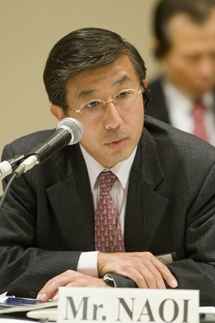
- In 2006, for the purpose of increasing the market transparency and the predictability for supply disruptions, and with a view to creating an environment where supply concerns are unlikely to occur, Japan proposed the "IAEA Standby Arrangements System for the Assurance of Nuclear Fuel Supply", under which the supplier countries would register in advance with the IAEA their stockpiles and supply capabilities of natural uranium as well as their conversion, enrichment, and fuel fabrication services.
- Thereafter, no progress has been made on this, although the seminar on the front-end of nuclear fuel cycle was convened in Vienna in January 2009.
(Carter)
- In 2007, the United Kingdom proposed an "Enrichment Bond" (credit) to guarantee the supply of LEU and the provision of uranium enrichment services. The scheme was later renamed the "Nuclear Fuel Assurance" (NFA) and was put into implementation. The proposal is a mechanism to back up the supply of LEU and the provision of uranium enrichment services by uranium enrichment companies, e.g., URENCO and their governments, e.g., supplier countries, such as the United Kingdom. While guaranteeing under an agreement between governments of the supplier country and the recipient country that the supplier country will not cut off supplies for political reasons, it also guarantees an alternative supply, under an agreement to be entered into in advance with the recipient country in anticipation of supply cuts, in the case where supplies are cut off by uranium enrichment companies and governments in other countries.
- The NFA was unofficially proposed to the IAEA Board of Governors Meeting in September 2009 and received support from various countries. Draft agreements for a series of guarantees are being considered.
(Ivanov)
- The International Uranium Enrichment Centre (IUEC) was set up two years ago, but there has been no enrichment contract signed because the Center has not yet found any customers. The Center was set up originally for a possible contract with Iran, because it would be more advantageous from the economic perspective to enrich uranium in Tomsk. Contracts with Turkey and Egypt may be conceivable, but it may take another five to six years before these countries actually introduce nuclear power generation.
- As the only function of the IUEC, a guarantee of LEU supply would be insufficient. It would be necessary to also give the Center functions to fabricate fuel pellets, manufacture fuel assemblies, and to manage spent fuel.
- A stockpile of low-enriched uranium and the IUEC may be constructive in terms of gaining experience in operating an international center.
(Scheinman)
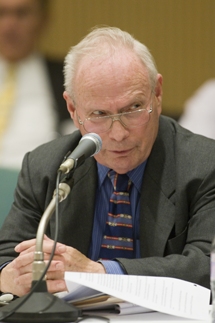
- I am concerned that expansion of the nuclear power market in recent years - in particular, increased worldwide interests in nuclear fuel cycle related activities, would lead to nuclear proliferation.
- In 2004, then President Bush proposed that nuclear supplier countries with enrichment and reprocessing technologies would transfer their enrichment and reprocessing technologies as well as facilities only to countries that already possess enrichment and reprocessing facilities in full-scale operation. However, this proposal caused concern that it would perpetuate the existing division between the haves and the have nots. The work is therefore being made to revise this proposal into an approach more acceptable to recipient countries (Note: That is, not to request recipient countries waive enrichment and reprocessing).
- What is important is to prevent and thwart proliferation of enrichment capabilities. Attractive incentives should be offered to new nuclear power generation nations, so as to ensure, in exchange, that fuel cycle technologies and facilities would not be developed in these nations.
(Yudin)
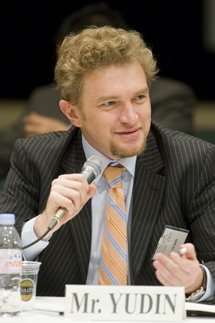
- LEU has been stockpiled in Russia as a last resort to be invoked in case of supply disruptions. A lack of customers is proof that the market is functioning in a sound manner - this itself is a good indication. With regard to the IUEC, if it does not have a customer, it may be the case that a consideration of its business model has been insufficient.
- A proposal was submitted to the IAEA Board of Governors Meeting in June 2009 that initiatives on a LEU stockpile and an IAEA fuel bank should be implemented at the IUEC in Russia. However, it did not receive support from Non-Aligned Movement (NAM) States and discussion of it was refused. However, at the IAEA Board of Governors Meeting in November, a proposal to build a stockpile of LEU at IUEC in Russia was adopted at the initiative of Russia and the work has started for its implementation, as was explained by the moderator.
- There is no legal or technical problem with these proposals; a lack of progress is due to political problems.
- Recipient countries (mainly developing nations) have doubt about, and distrust against supplier countries (mainly developed nations), and a common understanding or an agreement has not been established between the two sides on the need of supply guarantees and its mechanism. Unless a common understanding is achieved, it would be difficult to make progress in building a nuclear fuel supply guarantee mechanism.
(Scheinman)
- The notion that this issue has become a political problem is correct. The right to use of nuclear energy for peaceful purposes under Article 4 of the NPT, about which developing nations are concerned, is the right of NPT signatories which cannot be deprived. Developing nations wish that at least this right should be upheld.
- There are two different schools of thought, one is that the right is not necessarily applied to all nuclear fuel cycles, and another is that the right does not eliminate certain elements and thus should be applied to all nuclear fuel cycles. However, as provisions remain unclear on this, I believe that the latter view should be adopted.
- Having acknowledged the right to pursue nuclear fuel cycles, what is to become an issue is whether individual nations should build their own domestic facilities or a facility under multilateral control should be built in consideration of economic advantages (however, without sharing technologies).
(Naoi)
- Discussions based on the common understanding about the terminology of supply guarantees are necessary. A stockpile of LEU at IUEC in Russia would be a last resort to be invoked in the case of supply disruptions for political reasons other than nuclear nonproliferation, and as such, this stockpile is placed outside the market mechanism. On the other hand, the Global Nuclear Energy Partnership in the United States and the IUEC aim to ensure a stable supply of LEU through diversification of supply sources within the market mechanism.
(Lee)
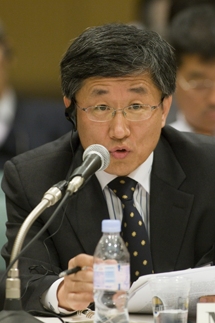
- What could be a key to the success of nuclear fuel supply guarantee is whether incentives could be provided, which can be attractive to countries without nuclear fuel supply technologies and which encourage these countries to participate in the mechanism, e.g., supplies of LEU at an economical and attractive price at all times, and a mechanism that covers all aspects of the fuel cycle from the LEU supply to the radioactive waste management.
(Pilat)
- The ongoing discussion on the supply guarantee has become political, and distrust among recipient countries (developing nations) is similar to that seen in the 1970s and 80s.
- In the existing proposals on the nuclear fuel supply guarantee, only the LEU supply is guaranteed. However, if a guarantee to take back and manage spent fuel is included, it may be possible to get rid of political factors as well as suspicion and distrust. The existing proposals are insufficient for having offered any details or merits, and in this context, it would be difficult to overcome political confrontations.
(Carter)
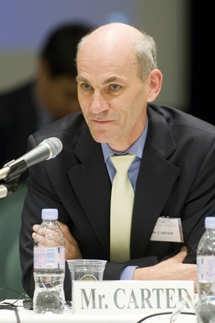
- The sense of distrust is unavoidable. In our approach, it is important to appeal the significance of supply guarantees on the use of nuclear energy for peaceful purposes (e.g., reduced costs), identify possible implications of supply cut off due to political and non-commercial reasons, share an understanding that supply guarantees would not be something which disturbs the existing market and that each proposal supplements one another, and to emphasize the need instead of imposing the need.
(Kuno)
- I do not believe that a system to "guarantee" a fuel supply is necessary at this moment. On the other hand, as a means to increase the supply, construction of an enrichment facility on their territory (that of the new nuclear power generation nation) by the black box methods may be attractive, even without technology transfer.
(Jorant)
- I would like to share my personal opinion as someone who is involved in this industry. In 2006, the World Nuclear Association (WNA) comprised mainly of companies, proposed a three-tiered system of nuclear fuel supply guarantees to supplement the supply in the existing market.
- Let us go back to the starting point. None of countries planning to introduce nuclear power suggest construction of an enrichment facility. Development of uranium enrichment technologies and construction of a facility require an enormous cost. Realistically thinking, it is highly improbable that a new nuclear power generation nation with only a few nuclear reactors dares to embark on this path.
- In the 1970s when enrichment services providers were exclusively the United States and the Soviet Union, following a refusal by the United States to guarantee fuel stockpiles in other countries, URENCO and Eurodif were established. In comparison, at the moment, there exists price competition under the market mechanism between four to six enrichment companies and the World Trade Organization (WTO) is monitoring whether or not proper competition takes place.
- As a bridge between the market mechanism and the political measures, a long-term export permit (not on a current two- to three-year basis, but on a ten-year basis) will be effective on condition that the compliance of the country concerned is reviewed with respect to its commitment to nuclear nonproliferation.
(Choi)
- A nuclear detonation conducted by India in 1974 was an example of a case where fuel supply disruptions due to political reasons became an issue. In this case, in spite of there being political factors, the United States continued to supply fuel to India and furthermore encouraged France and China to supply fuel to India. Therefore, there was no need for fuel supply guarantees.
- A case like this, where a fuel supply guarantee is required in response to a cut off due to political factors would rarely take place, but if there is a loophole to allow nuclear proliferation, no matter how small that might be, it needs to be closed. In this context, a role to be played by the mechanism of fuel supply guarantees in eliminating incentives for enrichment and reprocessing activities needs to be considered.
(Lowenthal)
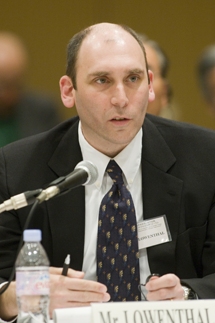
- In September 2008, the joint committee of the U.S. National Academy of Sciences and Russian Academy of Sciences published a joint report entitled "Internationalization of the Nuclear Fuel Cycle: Goals, Strategies, and Challenges". Findings and proposals presented in this report on the multilateralization of the nuclear fuel cycle, including the nuclear fuel supply guarantee and the back-end, which will be introduced below.
- The report was based on the assumption that as the number of countries with enrichment and reprocessing facilities increases, the risk of nuclear proliferation arises. Whether the same thing could be said about multilateral facilities was as an open question, which was considered in the report.
- The report listed seven conclusions, as follows:
- Few countries would be willing to give up the right to enrichment and reprocessing;
- None of the individual supply guarantee mechanisms proposed would be able to meet the needs of all countries on its own;
- It would be more and more difficult to keep a system in which a small number of countries have technologies and provide services. If a system could be developed to ensure that countries without technologies could also get a share of the profits, it would be possible to relieve the sense of unfairness;
- While the role of the supply guarantee as an incentive for waiving enrichment and reprocessing is limited, a take-back of spent fuel could deliver far bigger incentives. However, while many proposals have been made on the former, the latter has been taken up only in the proposal made by Russia. The reason for this is substantial political obstacles to the take-back of spent fuel of other countries;
- We should start implementing proposals which can be put into practice;
- An idea of multiple options to satisfy various needs was upheld; and
- Additional incentives should be provided in order to prevent construction of sensitive facilities.
(Yudin)
- I concur with Mr. Lowenthal in principle.
- The nuclear fuel supply guarantee and the multilateralization of nuclear fuel cycle facilities are not the same. The former is part of the latter.
- The reasons for there being a number of proposals on the fuel supply guarantee being made at the moment are that new nuclear power generation nations are interested in the guarantee of fuel supplies, not in the back-end, and that the front-end is easier to deal with while the back-end includes issues difficult to deal with.
(Choi)
- Efforts are being made to persuade Iran to give up its enrichment program, but the proposal on the fuel supply guarantee has not been functioning as a sufficient incentive. In order to make construction of an enrichment facility economically viable, twenty reactors are necessary. In the case of Iran, this is definitely not something that the country could deliver.
- Therefore, the question is how to respond to a nation wishing to acquire enrichment technologies from the perspective of becoming energy independent, not for commercial reasons.
(Scheinman)
- Iran once announced at a meeting that it planned to build six nuclear reactors. When I pointed out that their plan would not be economically viable, they came to me on the following day, saying that they had meant to say twenty nuclear reactors. Some countries like Iran carry out enrichment activities for the purposes of keeping the nuclear option open.
(Suzuki)
- Even if it is not economically viable, a nation could proceed with research and development in interests of acquiring technologies to enrich and reprocess domestically. However, even at the stage of research and development, the technology can be diverted for military purposes. Thus, once the right to research and development is acknowledged, then it would be difficult to put a stop to the capability of individual countries to disseminate nuclear technology for military purposes. The European Atomic Energy Community (EURATOM) created a system to share technological development across Europe, and I wonder if a similar system could be created on a worldwide basis.
(do Canto)
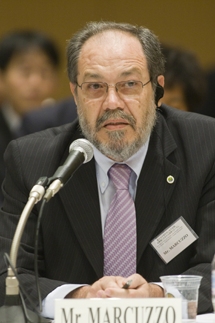
- As Mr. Stratford made it clear yesterday, efforts to acquire sensitive technologies are market issues.
- Brazil has abundant uranium resources, the sixth largest in the world, and is expected to become the second largest when its mining output increases. Considering that the size of the uranium market would expand in the future to several million U.S. dollars, Brazil does not want to be left out of this market. A former Brazilian ambassador explained the position of Brazil in his paper published, as follows:
- "Brazil and other Latin American nations will not develop nuclear weapons and will remain partners in the efforts to create a world without weapons of mass destruction. At the same time, Brazil does not intend to give up its objective of entering the nuclear fuel market as a key player and does not allow itself to be excluded from the nuclear fuel supply club comprised of a small number of members."
(Choi)
- For countries with uranium resources, such as Brazil and Kazakhstan, sales of uranium resources with added value are a factor which encourages these countries to pursue enrichment capabilities, thereby making incentives offered through supply guarantees less functional.
(Choi)
- Could efforts being made by a State to pursue enrichment and reprocessing capabilities be stopped? Could the multilateralization of the nuclear fuel cycle, including nuclear fuel supply guarantees and the take-back of spent fuel, be an effective framework for nuclear nonproliferation?
(Lowenthal)
- A discussion on the right to use nuclear energy for peaceful purposes under Article 4 of the NPT will lead to a discussion on the revision of the NPT itself. This is not the right direction. It is necessary to encourage participation into the multilateral mechanism by making an offer which is attractive from an economic viewpoint.
- Professor Geoffrey Rothwell at Stanford University recently published a paper analyzing enrichment costs.
- With regard to the supply guarantee, offers have already been put forward and there is little scope left to add further incentives. On the other hand, it is not clear whether attractive offers are being made with regard to the back-end.
(Yudin)
- If we bring in the question about a waiver in our discussion, it would only become a political issue - as such, we should refrain from doing so. It is necessary to discuss an attractive alternative that could replace the development of nuclear fuel cycle technologies and facilities by countries themselves.
(Suzuki)
- What we should do is, while acknowledging the right of NPT signatory countries to use nuclear energy for peaceful purposes, including building up their enrichment and reprocessing capabilities, establish incentives to prevent them from having facilities on their territories or discourage them from possessing surplus nuclear materials. It is possible to perform research and development without having domestic facilities. For example, the Central Research Institute of Electric Power Industry to which I belong is developing a dry reprocessing technology. As there is no hot laboratory in Japan, the actual work is being carried out in Europe.
(Kuno)
- Some countries would insist on possession of their own enrichment and reprocessing facilities, and it may be counterproductive to tell these countries that "possession is not allowed". Fairness is important.
- High criteria should be set by the international community under which anyone is allowed to have enrichment and reprocessing facilities - this may discourage countries from making efforts to meet the criteria to possess enrichment and reprocessing facilities. We should deal with countries that still dare to do so by different methods.
(Suzuki)
- I concur that the right to possess enrichment and reprocessing facilities should not be denied. Advantages of not having such facilities domestically should be demonstrated as an incentive.
(Carter)
- Only when the supply guarantee mechanism is to be practically applied, it will be known whether or not it would be effective.
- At the moment, NAM States have expressed lukewarm interest in the supply guarantee. For example, Jordan responded to a proposal by the United Kingdom, saying that, although the proposal looks attractive, it would give it serious consideration only when the introduction of nuclear power becomes imminent.
[Issue 2: Multilateralization of the nuclear fuel cycle including the back-end]
(Ivanov)
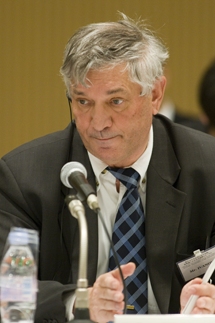
- With regard to the management of spent fuel, a decision at the political level - and at the top level - needs to be made at an early stage.
- For example, stop the operation of two RBMK reactors (high power channel-type reactor) in Lithuania (one has already been stopped, the other will be stopped in the near future) and store Russian origin spent fuel in dry fuel containers. Having provided the fuel, Russia has a complete knowledge of spent fuel. It would be easy to handle spent fuel if it is transported at this stage to a storage facility being built by Russia, but it would become difficult over time to handle it due to, for example, destruction of fuel pins. Situations in Hungary and the Ukraine are similar.
- These issues are not bilateral problems and need an international solution.
- Russia has a law to allow imports of spent fuel of its own origin, but an international agreement is necessary for the import of spent fuel, which is not. A U.S.-Russia nuclear energy cooperation agreement is one of the requirements, but this would not be enough.
- In discussions with Middle East nations, it has been suggested at the working level that they would be ready to give up a part of the nuclear fuel cycle if spent fuel storage services would be provided.
- It may be difficult to get understanding of the internationalization of the nuclear fuel cycle, but efforts should be made first of all to promote understanding of the back-end of the nuclear fuel cycle.
- In its relations with Iran, Russia incorporated provisions in the agreement it entered into with Iran that Russia would take back spent fuel. Therefore, political and technical problems associated with the take-back have already been resolved. It is agreed that Russian container and transport technologies would be applied. Furthermore, in two years' time, a dry fuel storage facility in Krasnoyarsk for spent fuel from VVER-1000 reactors (Russian-type light water reactors) and RMBK1000 reactors will commence operation.
(Jorant)
- Both the United Kingdom and France have commercial reprocessing facilities and can provide reprocessing services to other countries.
- However, two issues need to be noted, one, in compliance with its domestic law, France is required to return high-level radioactive waste to its origin, and two, countries signatory to the Joint Convention on the Safety of Spent Fuel Management and on the Safety of Radioactive Waste Management are bound by provisions of the Convention. These provisions provide among others that the country that produces waste is responsible for its management and that when the waste is exported, there should be a guarantee that the waste shall be properly managed in the destination country. A system may be required under which the IAEA would authorize exports of waste from a safety perspective.
- From the viewpoint of proliferation resistance, it is advised that spent fuel should be reprocessed to fabricate MOX fuel and to load it once again in nuclear reactors. Burning spent fuel as MOX fuel would reduce the benefit of plutonium as an ingredient in nuclear weapons. However, a take-back of MOX fuel needs to meet the NSG and other international requirements. Also, with regard to reprocessing as well as the use of plutonium, some bilateral agreements require consent by supplier countries, and international discussion may become necessary on the exercise of the right to consent.
- AREVA would like to provide thorough services from the front-end to the back-end; however, the high-level radioactive waste will be returned to its origin.
(Yudin)
- The use of MOX fuel in light water reactors may be one of the options, but this will not resolve the issue of how to deal with spent MOX fuel.
- I concur with Mr. Ivanov on the need to consider a spent fuel storage scheme within an international framework. Storage for up to 100 or 200 years is anticipated. Waste disposal within an international framework is a more difficult question.
(Choi)
- Would it be possible for AREVA to store spent nuclear fuel for 200 years before being reprocessed?
(Jorant)
- AREVA would not be able to do it. In general, prior to concluding a reprocessing contract, a commitment needs to be given by a requesting country to take back radioactive waste and a schedule needs to be identified.
- There is also a question of whether it would be possible to treat spent fuel in a safe manner over a period of 200 years.
(Yudin)
- At the moment, the prospect for the introduction of fast breeder reactors remains unclear and there is no reason that reprocessing should be done immediately.
(Kuno)
- Establishment of an international framework is important for the management of spent fuel. Once an international framework has been established, constraints under bilateral agreements may be relieved. It is also necessary to store spent fuel on an international basis and promote the use of plutonium at the same time. It would be too late to suddenly start doing so when a fast breeder reactor becomes necessary.
(Ivanov)
- Our main scenario is not to reprocess until a next generation fast breeder reactor is built, and to store on an interim basis until then.
(Jorant)
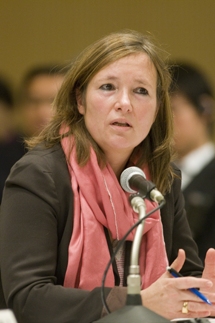
- The basic policy is to reprocess spent light water reactor fuel and to use it as MOX fuel.
- With regard to MOX spent fuel, there are two options, i.e., to reprocess; or to store to be loaded in light water reactors and fast breeder reactors.
- It may be possible that, if there is a country requesting its spent fuel reprocessed, following its reprocessing at existing reprocessing facilities, the reprocessed fuel could be used as MOX fuel in the reprocessing country or in other countries with experience in using MOX fuel. In such a case, by returning the equivalent amount of energy in the form of uranium fuel to the country that has requested reprocessing of its spent fuel, or through different financial arrangements, a situation beneficial to both sides, i.e., win-win situation, would be provided.
- If the number of countries that require reprocessing increases, it is conceivable that the capacity of existing reprocessing facilities should be increased or a facility under multilateral control should be set up.
(Choi)
- AREVA is providing spent fuel reprocessing services. However, in consideration of the fact that spent fuel is stored for some time prior to actually being reprocessed, it is possible to interpret that an intermediate storage of spent fuel is virtually being arranged. What is an issue is whether or not it would be possible to extend the storage period. In the meantime, the international community will be able to conduct joint research and development with a view to reducing environmental burdens and to consider when would be an appropriate time to reprocess stored spent fuel.
(Ivanov)
- Whether or not the minor actinides are contained in the reprocessed high-level radioactive waste makes a huge difference. It would not be easy to control the minor actinides, which have a long half life. In the future, these minor actinides will be burned in fast breeder reactors.
(Pilat)
- It is necessary to identify the intention of various proposals on the multilateralization as to what kind of issues they intend to resolve.
- It needs to be questioned whether or not progress on disarmament and distribution of sensitive facilities could be compatible.
(Lowenthal)
- (With regard to the relevance of disarmament raised by Mr. Pilat), there are concerns that a situation where nuclear weapons have been abolished would be insecure and would be impossible to analyze. Placing enrichment and reprocessing facilities under multilateral control would contribute to reducing the break-out possibility and to increasing the stability.
(Scheinman)
- In the study I conducted with my colleagues for the U.S. government, we identified the criteria to become a host country of an international spent fuel storage facility, e.g., credibility and stability in terms of nuclear nonproliferation, and with no opposition from neighboring countries.
(Ito)
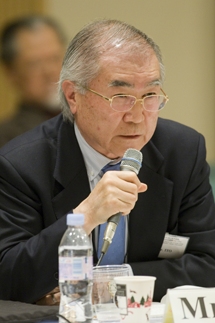
- Neither the nuclear fuel supply guarantee nor the take-back of spent fuel will deprive the inherent right to use nuclear energy for peaceful purposes under Article 4 of the NPT. These are to create incentives to prevent the diffusion of sensitive technologies, such as enrichment and reprocessing technologies, and in this context, these need to be made more attractive. However, none of several existing proposals is a silver bullet or panacea. Incentives alone cannot prevent nuclear proliferation. A variety of measures need to be combined together, e.g., make technical barriers higher; make a system more solid; perform more effective safeguards; and set up an international scheme under which, in some cases, a binding force would be exercised against breach.
- As is noted in the Framework for Nuclear Energy Policy, Japan should be actively involved in the discussion on the multilateralization. It is important that, in discussion, positive aspects of the new framework, such as the possibility of reduced safeguarding, should be emphasized. It is important that, under common belief that nuclear energy is necessary for the global environment or for ensuring energy stability, as well as that use of nuclear energy should be limited only to peaceful purposes; these issues should be discussed at many forums.
(Gu)
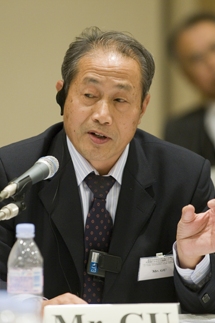
- Concerning the multilateralization, since the back-end is more complex than the front-end, focus should be placed on the back-end in discussion. In this context, I would like to comment, as follows:
- With regard to the back-end, while reprocessing spent fuel for recycling as MOX or burning MOX fuel in light water reactors are already established technologies, the fuel cycle technology for fast breeder reactors is still in the research and development phase. In order to internationalize the back-end, it is necessary first of all to establish the technology. Further research and development as well as international cooperation in this area should be encouraged.
- A step-by-step approach is desirable. There are some difficult issues, in particular, no progress has been seen in the discussion on the disposal of radioactive waste within an international framework, although the topic does not involve sensitive technologies. It is important not to be too optimistic.
- Countries with large-scale nuclear programs, such as the United States, Russia, Japan, South Korea, China and India, can never totally depend on other countries. I believe it is necessary for these countries to design, construct and operate nuclear fuel cycle facilities in their own territories. For example, a substantial amount of spent fuel has been stockpiled in Japan, and it would be most costly to send it to Russia for reprocessing and to take back radioactive waste.
- When launching an international nuclear fuel center, it should be based on the program being implemented in the country.
(Pilat)
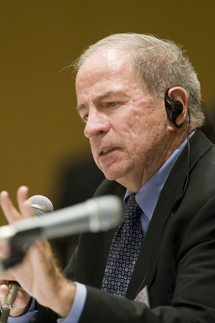
- As referred to in the comments by Mr. Ito and Mr. Gu, a positive attitude is required in international research and development of back-end technologies. However, in the current discussion on the supply guarantee and the multilateralization of a nuclear fuel cycle facility, there is a lack of vision right from the start, as to the purposes and advantages of such schemes. Once again, we need to step back and clarify these.
(Lee)
- Mr. Gu pointed out that countries with large-scale nuclear programs should implement their programs domestically, but South Korea does not have enrichment or reprocessing capabilities. At the moment, 20 nuclear reactors are in operation in South Korea, with its spent fuel stockpile reaching 10,000 tonnes. South Korea plans to increase the share of nuclear power to 59% by 2030, and it is envisaged that its spent fuel stockpile would reach 100,000 tonnes by 2100. The spent fuel management is a serious issue and dependence on foreign countries is also a necessary option. This is why an international discussion on the multilateral approach is required. A possible multilateral approach would be either a permanent storage of spent fuel or a new recycling structure to reduce the amount of waste to a minimum and thereby reduce radiation.
- Furthermore, in consideration of the fact that it will be an electric company in South Korea which ultimately makes a decision to carry out spent fuel to other countries, the multilateralization concepts need to deliver economic incentives.
(Suzuki)
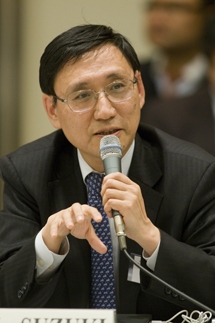
- Introduced the study conducted on behalf of the Japanese government by a group of researchers, which included him.
- The reasons for a lack of progress on the nuclear fuel supply guarantee and the multilateralization of the nuclear fuel cycle are double standards and unfairness, a lack of transparency, market mechanism not being fully taken advantage of, and there being no destination for spent fuel. Three conditions required for a success of the multilateralization are universality, transparency, and economic rationality.
- With regard to the multilateralization of the fuel cycle I would like to propose five packages, as follows (reference should be made to Projected Material, "Civilian Nuclear Power and Nuclear Non-Proliferation: How to minimize risks associated with expansion of nuclear fuel cycle activities?"):
- Reduction of surplus nuclear materials, which can be diverted for weapons purposes. Use existing stockpiles, ensure intermediate dry storage capacity, make the policy of Japan not to have any surplus plutonium the world standard, and establish the "international plutonium disposition program (IPDP)".
- Internationalization of the fuel cycle and joint fuel stockpiles. Internationalize all nuclear fuel cycle facilities and set up joint stockpiles of natural uranium and enriched uranium between suppliers and consumers.
- Formulation of a code of conduct and establishment of a disarmament/nuclear nonproliferation fund by the nuclear industry. The nuclear industry should formulate a code of conduct in relation to the three principles, i.e., not to build nuclear weapons, not to transfer sensitive technologies, to make best efforts to ensure safety and to protect nuclear materials, and to finance only those who meet these requirements from the fund.
- A review of the nuclear fuel cycle plan of Japan. Internationalization of the nuclear fuel cycle and initiative to develop advanced nuclear energy systems that do not use nuclear materials which can be diverted for weapons purposes, e.g., recovery of uranium from seawater, a chemical proteomics-based enrichment technique with which it is difficult to fabricate highly enriched uranium, thorium-based MOX fuel to reduce plutonium, and small nuclear reactors with an ultra long-life core that do not require reprocessing.
- Reinforcement of nuclear security. Japan should reinforce its nuclear security to the world's highest level, thereby making contributions on a global basis.
(Ito)
- With regard to the proposals from Mr. Suzuki, there are many issues to be discussed in the future and that takes time. Each issue should be discussed on an individual basis and we need not hastily find a conclusion in this forum. As such, it is important that we will remain aware that mutual efforts without creating discrimination would be rational in terms of economy, efficiency and nuclear nonproliferation, and that we will engage ourselves in thorough dialogue and discussion in the future.
(Kuno)
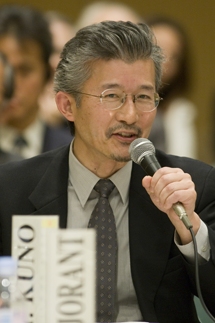
- Following the discussion in the study group at the Track II level attended by electric companies, national institutions, universities and others, the University of Tokyo compiled a report on the concept which would make the international control and the recycling of spent fuel compatible. The main idea of the concept is that because the number of countries that use plutonium is limited, non-user countries would be compensated with money or with energy. It is proposed that the concept should be implemented on a regional basis, so that regional safeguards would become one of major functions of the multilateralization.
(Gu)
- With regard to the multilateral control, it may be easier to implement it through regional cooperation than at the international level. However, the latter would be more attractive and advantageous for new nuclear power generation nations.
- For East Asian countries, including Japan, South Korea and China, it is necessary first of all that they establish their own nuclear fuel cycle systems. Once this has been done, we should be able to build cooperation, for example, by establishing a regional center, to meet the needs of individual countries and emerging nuclear power nations.
(Naoi)
- The term "multilateralization" has so far dominated our discussion, but it is important to start discussing what this term would specifically entail. As the nuclear situation in every country varies, it would be difficult to draw conclusions from the discussion. We should start with what could be achieved on a step-by-step basis, for example, an intermediate spent fuel storage facility may be set up on a multilateral or regional basis.
- Multilateralization has been discussed for 50 years. At last, an LEU stockpile at the IUEC in Russia is about to be created and the actual needs are rising at the moment as a result of the nuclear renaissance. It is therefore important to deepen a discussion on this issue.
(Lee)
- A regional approach may be easier than an international approach, but every country has its own nuclear energy policy and objectives. If a regional approach is to be adopted, then policy coordination between countries is necessary as a precondition. South Korea has not drawn any conclusion nor has it made any decision about spent fuel management. Various options are under consideration. Japan has already decided to adopt a closed fuel cycle. In any case, political coordination may be necessary between Japan, South Korea and China.
(Choi)
- When I was at the IAEA, we once requested that plutonium in the United Kingdom should be disposed of in France, but it did not work. What could work would also depend on the domestic programs of individual countries.
- I believe that an approach at the regional level may also aim to reduce the costs of safeguards. What do you think?
(Kuno)
- It would be better if a safeguards system incorporating proliferation resistance could be developed at the same cost, but that alone may cost more. Introduction of international controls may raise credibility and reduce safeguards.
(Choi)
- The Asia-Pacific Safeguards Network (APSN) is a platform that may be used to develop multilateralization of the nuclear fuel cycle in Asia.
[Questions and answers session with the general audience, and comments]
(general)
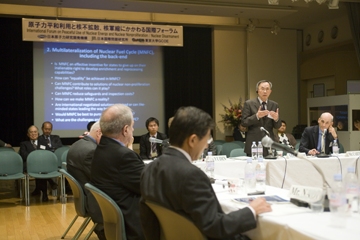
- Spent fuel is the important fuel source that contains plutonium, and plutonium can be used as a fissile material in the application of thorium. I heard that China has a huge stock of thorium up to 30,000 tonnes, and I would like to ask Mr. Gu whether or not thorium in China could be used with plutonium in the world.
(Gu)
- I believe that thorium is a potential resource but is not the option at the moment. Thorium is more suited for use in thermal neutron reactors than in fast breeder reactors.
(general)
- It should be remembered that the purpose of this discussion is not to establish a multilateral approach to the management of nuclear fuel cycle facilities, but to consider whether or not the multilateralization is effective from the perspective of nuclear nonproliferation and how such a scheme should be developed.
(general)
- The public would be happy if the price of electricity comes down. It seems that in Europe the awareness of the cost of nuclear energy plays a major part. Universities and others in Japan should also discuss issues relevant to daily life from a practical point of view, such as a code of conduct and cost saving measures.
(Choi)
- We do not intend to have an unrealistic discussion among people confining themselves to the "ivory tower". We are not discussing a simple, theoretical issue. With regard to the down-to-earth issue of promoting nuclear energy as a source of power, for example, we have discussed who should be responsible for the management of spent fuel. With regard to those issues that accompany the introduction of nuclear energy, unless a recipient country is provided with support, or at least presented with possible solutions, then it will have to look for other non-nuclear ways of generating electricity.
(Kuno)
- We do not study issues which are totally irrelevant to reality. While promoting peaceful uses of nuclear energy, Japan needs to promote nuclear nonproliferation in parallel; otherwise, Japan will not be able to survive as a user in the nuclear power market in the future. Also, the multilateralization of nuclear fuel cycle facilities may sound like something to happen in the far future. However, in consideration of a possibility that substantial progress is made in the future in initiatives for a multilateral approach to the management of nuclear fuel cycle facilities, and because these initiatives require international coordination and take time, it is necessary to start discussion and consideration now.
(Pilat)
- Fundamental issues regarding the multilateralization of nuclear fuel cycle facilities should be identified, i.e., multilateralization for what purpose, with whom, and at what level, whether black boxing of technologies is requested and whether it would satisfy the request from a recipient country, and whether what is requested is something to be accepted by the industry. It is necessary to work out the details one by one.
(Jorant)
- Why should the industry be involved in nuclear nonproliferation? Although some people at COGEMA (now AREVA) thought that nuclear nonproliferation was a political matter and was thus essentially irrelevant to the industry, we have maintained that promoting nuclear nonproliferation would lead to benefits for the industry itself.
- Our argument is based on the facts that for one thing, we who deal with nuclear materials need to demonstrate that we deal with these materials in an appropriate manner, for another, our responsibility arises when nuclear materials and equipment are being exported,, and furthermore, the industry itself can contribute to finding solutions to nuclear nonproliferation issues, such as the disposal of the weapons-grade plutonium in nuclear reactors. The industrial code of conduct can be used as a communication tool and should be applied to all aspects of our activities and to all employees in the industry.
- As an international business entity, we contribute to the international proliferation of a nuclear nonproliferation culture.
(Ito)
- A step-by-step approach should be applied to issues concerning the nuclear fuel supply guarantee and the multilateralization of nuclear fuel cycle facilities, in order to gain experience one by one. If everyone believes that nuclear energy is absolutely indispensable for sustainable development of the Earth, then it is not something to be considered only by States; it is important that all relevant parties, e.g., industries, research institutions and academia, share understanding of the responsibility to be discharged and the role to be played by each of them.
<<Summary of the round-table discussion 3>>
Issue 1 " Assurance of fuel supply" and Issue 2 "Multilateralization of the nuclear fuel cycle including the back-end"
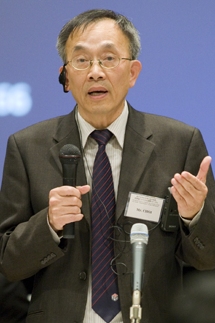
- A discussion which may lead to a waiver of use of nuclear energy for peaceful purposes under the NPT is not productive. Attractive offers which may give incentives to recipient countries need to be presented.
- The fuel supply guarantee deals with only a part of the multilateralization, i.e., fuel supply disruptions due to political reasons. The back-end is an issue for the future.
- Disposal of spent fuel is not the only issue facing existing nuclear power generation countries. A country planning to introduce nuclear power generation will also face this problem once nuclear power generation has been introduced. In this context, international cooperation, including multilateralization, needs to be considered.
- Views of panelists on the timing of reprocessing varied, but they all acknowledged the importance of setting up an international framework for storage of spent fuel.
- In order to set up a multilateralization framework, discussions should be held between various relevant parties, e.g., States, industry and academia, and a step-by-step approach should be applied to start implementation of what can be done in reference to circumstances of each country. In particular, it is important to involve the nuclear industry in these discussions, because it will be involved in such a framework.
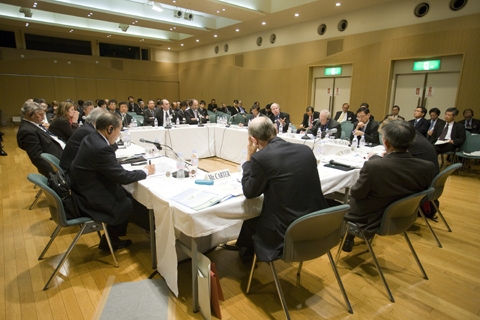
Closing remarks
Mr. Satoru TANAKA, Professor, the University of Tokyo, Japan
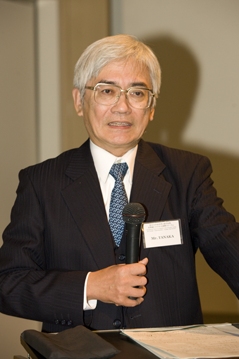
- The purpose is to promote peaceful uses of nuclear energy, and in order to do so, it is necessary to promote nuclear nonproliferation, raise nuclear security standards, and to promote nuclear disarmament.
- Discussions in the past tended to be only superficial, as the use of nuclear energy for peaceful purposes, nuclear nonproliferation and nuclear disarmament are highly political matters. However, it was possible to discuss in a non-political, academic manner in this Forum, as the event was sponsored jointly by the research institutions and the university.
- Appreciation was expressed to the overseas panelists and all the people involved for their constructive discussion and cooperation.
Note
